
THE OFFICIAL MAGAZINE OF THE BRITISH CHAMBER OF COMMERCE SINGAPORE ORIENT MAGAZINE LOOK INSIDE FOR MORE THOUGHT LEADERSHIP & ADVICE FROM OUR MEMBERS ON SUSTAINABILITY, ARTS & CULTURE, EDUCATION, LAW, WELLNESS, BRANDING, UK PROPERTY AND MORE! CUSTOMER LOYALTY SUPPORTING THE UK’S AMBITIONS IN APAC BARCLAYS CELEBRATES 50 YEARS IN SINGAPORE Issue 94 September 2023 orient-magazine.com
CONTENTS
Issue 94 / September 2023
18 21 22 26
IN FOCUS INTERVIEW: NATALIE BLACK CBE, THE FIRST TO HOLD THE ROLE OF HIS MAJESTY’S TRADE COMMISSIONER FOR ASIA
COMMENTARY / BRITISH BUSINESSES SIGNAL THEIR CONTINUED CONFIDENCE IN SINGAPORE BUT RAISE CONCERNS
MEMBER PROFILES / CELEBRATING 50 YEARS OF BARCLAYS IN SINGAPORE
ROAD TO NET ZERO / THE POWER OF STORYTELLING TO DRIVE SUSTAINABLE CHANGE
30 32 34 38
SECTOR INSIGHTS / PIGEONHOLES AND FALSE DICHOTOMIES: MODERN EDUCATION SHOULD FOCUS ON OPENING NEW DOORS FOR STUDENTS, BUT NOT AT THE EXPENSE OF CLOSING OTHERS
ARTS & CULTURE / TOMORROW’S WORLD POST-COVID
CUSTOMER LOYALTY / HOW TO TRANSFORM CUSTOMER LOYALTY & SUSTAINABILITY WITH NFTS IN 2023
CUSTOMER LOYALTY / CAN CUSTOMER LOYALTY PROGRAMS HELP BRANDS IN APAC GROW THEIR POOL OF LOYAL PATRONS?
42 44 46 48
BUSINESS SUPPORT / LEGAL KNOWLEDGE UPDATES –CRYPTOCURRENCY
BUSINESS SUPPORT / TACKLING THE NEW REALITY OF INFORMATION AND CYBER SECURITY
51 53
ADVICE / THE UK PROPERTY INVESTORS GUIDE TO THE UK
ADVICE / EXPANDING YOUR ENTERPRISE TO ASIA: THE UNVEILED POTENTIAL
BUSINESS SUPPORT / ORIGINALITY IS UNIQUE
BUSINESS SUPPORT / WELLNESS WASHING
56
Features
ADVICE / WHAT IS UK DOMICILE AND WHY DOES IT MATTER? Issue 94 / September 2023 2 / orient-magazine.com
In Every Issue
PRESIDENT’S MESSAGE
Hear from our President, Damian Adams, on our key priorities and support for members
NEWS & HIGHLIGHTS
What’s been happening at the Chamber, at our member companies, in Singapore, in the UK and around the region
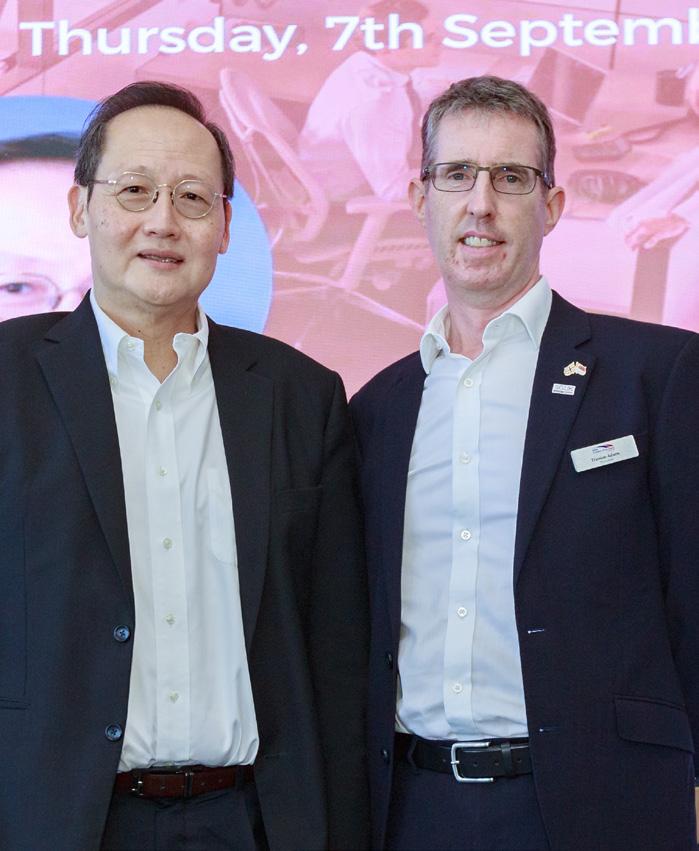
WELCOME TO OUR NEW MEMBERS
Find out who has joined our network
INSPIRATION FROM THE TOP

Learn a little wisdom from those at the top of their game
THE CONTENT MIX
Popular or recommended content to support your business and personal skills development, helping to generate new ideas for your business and team.

10
5
14 16 17
CONTENTS Issue 94 / September 2023 3 / orient-magazine.com
HOW TO CONTACT US
Address: British Chamber of Commerce Singapore
137 Telok Ayer Street #06-03 Singapore 068602
Web: britcham.org.sg
Phone: +65 62223552
Email: General: info@britcham.org.sg
Editorial & Advertising: marcoms@britcham.org.sg
Social: LinkedIn Instagram Twitter Facebook YouTube Flickr
Update your subscriptions: britcham.org.sg/newsletter
ORIENT MAGAZINE
SEPTEMBER 2023
EDITOR / Lucy Haydon
orient-magazine.com
THE BRITISH CHAMBER OF COMMERCE EXECUTIVE TEAM
EXECUTIVE DIRECTOR / David Kelly
DEPUTY EXECUTIVE DIRECTOR / Lucy Haydon
HEAD OF EVENTS / Ashni Degamia
HEAD OF MEMBERSHIP / Clare Hakes
EVENTS EXECUTIVE / Caitrin Moh
MARKETING & COMMUNICATIONS EXECUTIVE / K Praveena
FINANCE MANAGER / Radhika Chauhan
OFFICE MANAGER / Anna C Garciso
THE BRITISH CHAMBER OF COMMERCE BOARD
PRESIDENT / Damian Adams, Watson Farley & Williams LLP
VICE PRESIDENT / Simon Middlebrough, SAESL
VICE PRESIDENT / Haslam Preeston, DFI Retail Group
SECRETARY / Nick Magnus, Dulwich College (Singapore)
TREASURER / Christina Mason, PwC
Andrew Clark, AsiaWorks
Andy Marr, 8build
Angel Cheung-Horenfeldt, Standard Chartered Bank
David Haigh, EY
Dr. Lissy Vadakel, British Council
Lorena Paglia, Microsoft
Michael Buchanan, Temasek International
Michael Yap, Coventry University
Penny Murphy, ERM
Prakash Pinto, Standard Chartered Bank
Simon Bennett, Swire Shipping
Suzy Goulding, MSL Group
Steve Firstbrook, Department for Business & Trade
Issue 94 / September 2023 4 / orient-magazine.com
Earlier this month at the G20 summit, UK Prime Minister Rishi Sunak and Singapore Prime Minister Lee Hsien Loong signed a new strategic partnership between the UK and Singapore, formally upgrading the relationship between the two countries and setting out a direction for that relationship for the next decade. Key areas in which the partnership will benefit both nations include increased economic cooperation; joint initiatives in relation to climate, sustainability, the green economy and energy; cooperation on research, science, innovation and technology; and collaboration on security and defence. As another important milestone in the relationship between UK and Singapore, we look forward to hearing further updates from our colleagues at the British High Commission as to the detail of the partnership and what this means for businesses in the region.
In terms of business as usual, we recently shared the results of our latest sentiment survey, further details of which appear on page 21. Findings of the survey confirm that respondents remain committed to Singapore for the future, despite the current challenges in the market around recruiting and retaining talent. These topics were addressed at our recent Member
President’s Message
Dialogue with Dr Tan See Leng, Minister for Manpower.
Perhaps not surprisingly, costs of doing business, including talent related costs, remain key areas of focus and concern. Nevertheless, we continue to see strong appetite for Singapore as a place to do business, and the article by Segovia on page 53 provides great information on how companies can expand into Singapore and Asia.
September marks the conclusion of Natalie Black CBE’s term as the first person to occupy the role of His Majesty’s Trade Commissioner for Asia Pacific. Natalie has been a strong supporter of the Chamber during her five years in Singapore and we are grateful for her collaboration and drive to champion the UK in this region. You can read Natalie’s own perspectives on her time in the role in our interview on page 18. We welcome the new HMTC Martin Kent as her replacement in the post, and we very much look forward to building an equally strong relationship with him and to working together to champion the UK in our region.
The first workplan meetings for the Green Economy Framework took place this month. We can now look forward to colleagues from the British
High Commission sharing with our various Business Committees the Government-level progress made on the workplans across the three GEF pillars of low carbon tech, transport and maritime and green finance.
This time of year typically represents peak events season for the Chamber, and this year is no different. Marking the “return to work” after the traditional longer summer break, we hosted in August the fantastically well-attended Big Pub Quiz and the more recent F1 networking and Q&A with F1 commentator David Croft (“Crofty”). The next flagship event on the horizon is the 24th edition of our iconic Annual Business Awards, taking place on 12 October at the Shangri-La Hotel. Congratulations to all the finalists, as we look forward to yet another fantastic evening with Guest of Honour Minister for Trade and Industry Mr Gan Kim Yong, celebrating the successes of all who have taken part and the winning entries.
My best,
Damian Adams President British Chamber of Commerce Singapore
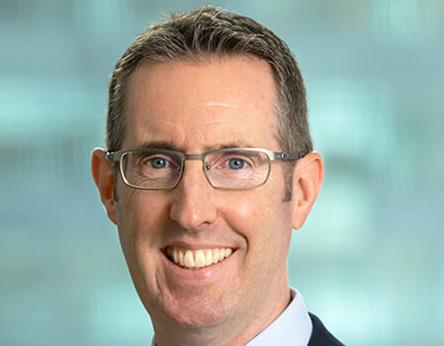
PRESIDENT’S MESSAGE 5 / orient-magazine.com Issue 94 / September 2023
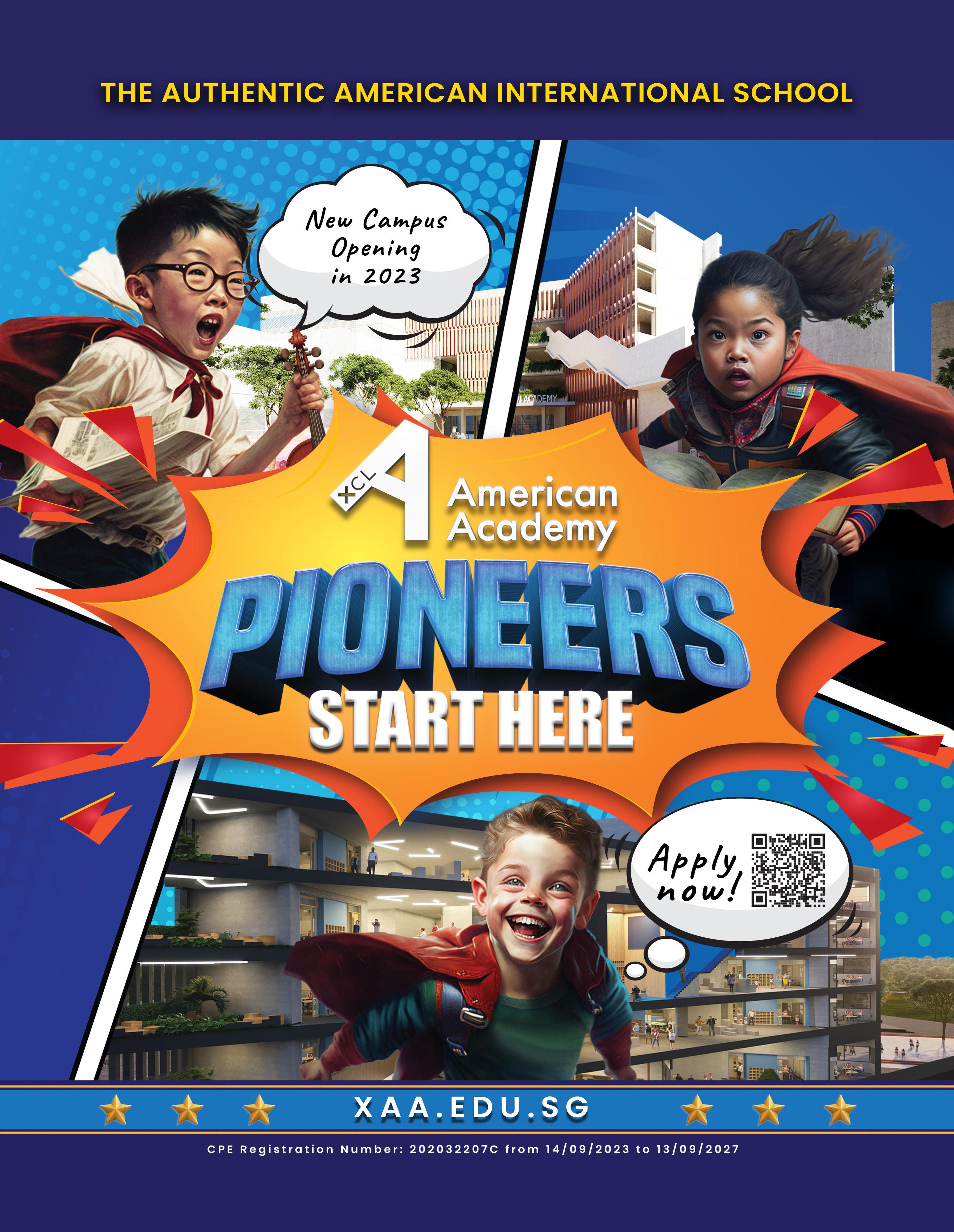
The greatest lessons are often outside the classroom.
At Dulwich College (Singapore) we believe in nurturing global citizens and well-rounded future leaders who are equipped to create solutions to the world’s challenges. Our goal is to encourage our students to Live Worldwise – to make informed choices, take inspired action and create positive impact. Our innovative and world-changing education is wellbeing-focused and balances academic excellence with a wealth of co-curricular opportunities that enable our students to discover their individual talents and passions.
To learn more visit Singapore.dulwich.org or call admissions at 6890 1003



Dulwich College (Singapore) CPE Registration Number: 201027137D. Period of Registration: 09 January 2020 to 08 January 2024. School Location: 71 Bukit Batok West Avenue 8, Singapore, 658966
Starting from Nursery, Tanglin creates an environment where children’s natural curiosity can grow and flourish into a lifelong love of learning.

Children thrive in our exciting learning landscape – one that has been cultivated through years of careful planning and the dedication of Tanglin’s exceptional Nursery team. Classrooms, outdoor areas and the inspirational curriculum are designed to capture children’s imagination, nurture their inquisitive minds and create a magical hive of activity.
High levels of engagement lead to high levels of attainment as our children embark on their extraordinary journey through one of Singapore’s most established international schools.
Tanglin is the first school in Asia to achieve the Curiosity Approach™ Accreditation.
Find out more at www.tts.edu.sg and discover why Tanglin was named International School of the Year 2023.

Seeds of ideas and attitudes, once taken root, can last a lifetime.
CPE Reg. No. 196100114C (7/6/2023 - 6/6/2029)
NEWS / AT THE CHAMBER
This month has seen significant strides in digital trade and a focus for our members on talent.
INTERNATIONAL CONSORTIUM, INCLUDING INDUSTRY & TECHNICAL EXPERTS & THE BRITISH CHAMBER OF COMMERCE SINGAPORE, ACHIEVES FIRST FULLY DIGITALISED CROSS-BORDER GOODS MOVEMENT SINCE THE UK’S ELECTRONIC TRADE DOCUMENTS ACT CAME INTO EFFECT
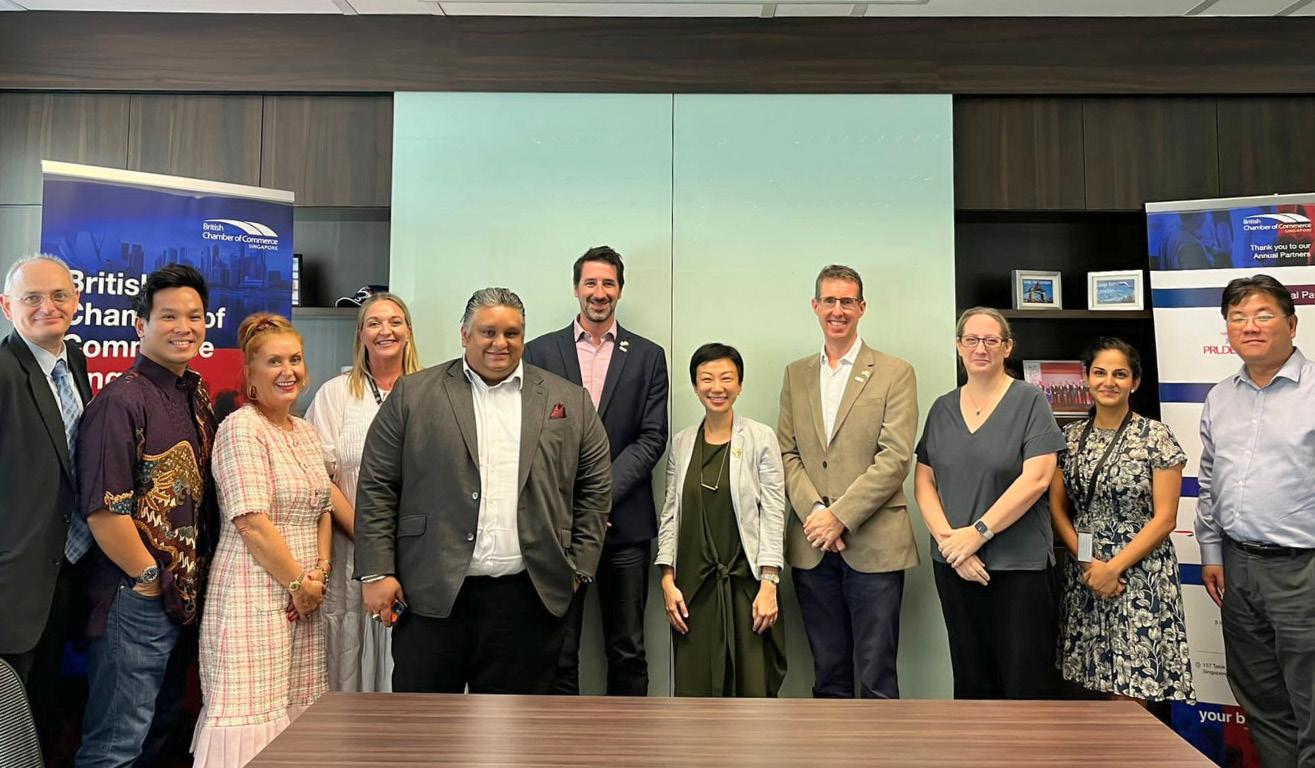
In a ground-breaking stride, an international consortium, comprised of key industry and technical leaders and bolstered by the support of government, business, and other major organisations, has announced the successful execution of the world’s first entirely digitalised cross-border movement of goods.
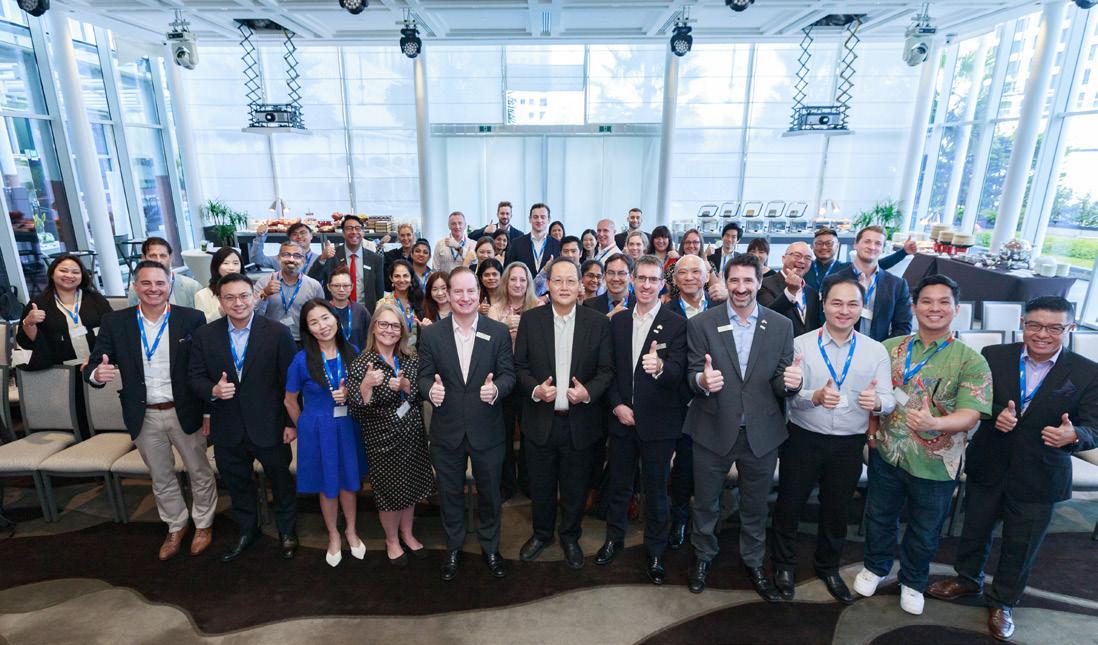
This monumental step, geared towards transforming global trade to be more cost-effective, efficient, resilient, and environmentally conscious, is built on the foundation set by the UK Electronic Trade Documents Act (UK ETDA) which came into force on 20th September 2023.
Facilitated by the British Chamber representing British businesses in Singapore, this pilot initiative stands as a testament to the ambitions of the UK-Southeast Asia Trade Digitalisation Pilot’s through a collaboration of organisations in both countries. What made this shipment remarkable was the utilisation of electronic trade documents and fully digital logistics documents, all of which were captured on an enterprise-grade permissioned distributed ledger technology (DLT) platform, across both jurisdictions.
Taking the baton at different stages of this historic transfer were Singapore Airlines, NG Transport, Woodland Group, BT CCS-UK, and EES Freight Services. The entire process was paperless, leveraging the robust capabilities of the LogChain platform to ship goods from the Manchester office of Fort Vale to their Singapore site.
BRITISH CHAMBER HOSTS DISCUSSIONS WITH THE MINISTRY OF CULTURE, COMMUNITY & YOUTH (MCCY) AND THE MINISTRY OF MANPOWER (MOM)
On 14th September, we hosted a senior representative from the Engagement Division at MCCY in a Chatham House roundtable with key members, organised by our Diversity & Inclusion Committee. The conversation focused on nurturing social cohesion, and fostering a sense of belonging for everyone who calls Singapore home. We explored the power of shared experiences in building trust and integration, encouraging participation outside of the typical circles of interaction, and fostering relationships that transcend boundaries. Additionally, we addressed socio-economic gaps, acknowledging the need to create opportunities for interaction across all levels of society.
Earlier, on 7th September, the British Chamber held our annual Member Dialogue with the Minister for Manpower, provided to all member company as a complimentary value-add event where organisations can raise their questions, feedback or challenges to the Minister and his team in a closed-door, honest environment. As Minister Tan stated in his comments following the session, “The key to harnessing opportunities is to ensure that we are always well-prepared for the evolving future of work. We have a strong economy and a skilled workforce. We need to build on these foundations by having our workers take charge of their own career health, stay abreast of the emerging trends, and upskill themselves to stay ahead of competition.”
NEWS Issue 94 / September 2023 10 / orient-magazine.com
UK APPOINTS NEW HM TRADE COMMISSIONER FOR ASIA PACIFIC TO LEAD TRADE AND INVESTMENT RELATIONSHIP
Martin Kent has been appointed as His Majesty’s Trade Commissioner for Asia Pacific, succeeding Natalie Black CBE. HMTCs lead the UK’s overseas effort to promote UK trade, investment, trade policy and export finance.
As the new HM Trade Commissioner for Asia Pacific, Kent will generate business opportunities for the UK while contributing to the growth of sustainable, resilient, and productive economies across the region.
Prior to his new role, Martin Kent was the Minister and Deputy Head of Mission in the British Embassy Tokyo, a Director within the Department for Business and Trade, and also HM Deputy Trade Commissioner for Africa. He started his career with the Boston Consulting Group (BCG), and has worked across the Asia Pacific region, including in BCG’s Singapore and Australia offices.
With total UK-Asia Pacific trade worth £120.5 billion, a growing population and a flourishing trade and investment relationship, the Asia Pacific holds vast potential for UK businesses and consumers.
HM Trade Commissioner for Asia-Pacific, Martin Kent, said:
“I am delighted to be appointed as His Majesty’s Trade Commissioner for Asia Pacific. The region is the engine room of the global economy and is a major driver of global economic growth and opportunity for UK businesses.
I will be focused on securing and implementing high-quality Free Trade Agreements, attracting investment to all parts of the UK, opening markets for UK exporters, and positioning the UK as a beacon for free trade in the Asia Pacific region.”
BEYOND THE CHAMBER
Business news and opportunities from around Singapore, the UK, the ASEAN region and beyond.
UK AGREES NEW STRATEGIC PARTNERSHIP WITH SINGAPORE AT THE G20 SUMMIT
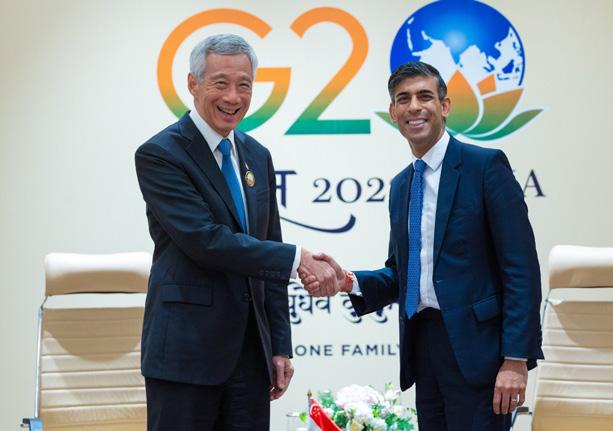
The UK’s economy will be bolstered and security strengthened under a new bilateral partnership with Singapore agreed by the Prime Minister on 9th September.
The Prime Minister met Singaporean Prime Minister Lee Hsien Loong in the margins of the G20 Summit in India to sign a new UK-Singapore Strategic Partnership. This agreement will set the direction of UK-Singapore relations for the next decade, upgrading the UK’s trade and investment relationship with one of Southeast Asia’s leading economies in recognition of shared expertise and interests in areas like technology and clean energy.
Following the Strategic Partnership, the UK and Singapore will work to conclude a new and modern bilateral investment treaty – the first the UK has negotiated since leaving the EU. This will give Singaporean companies more confidence to invest in the UK and vice-versa, creating jobs and growing both economies.
Read the full story here
SINGAPORE TO LAUNCH NEW TRAINING PROGRAMME TO BOOST SEMICONDUCTOR TALENT POOL
A new six-month training programme for integrated circuit design will be launched in August 2024 to train up to 150 people over the next five years, developed by the Singapore Semiconductor Industry Association (SSIA), Nanyang Technological University and the Economic Development Board (EDB). The programme was announced by the Minister for Trade & Industry this month at an event to celebrate the 55th anniversary of the semiconductor industry in Singapore.
The minister said Singapore’s growing pool of talent is one of the key differentiators that have and will allow the Republic to attract investments in an industry that has become the focus of intensifying global competition. Countries around the world are rolling out massive subsidies to onshore and friend-shore investments closer to home, something Singapore cannot afford to match, he said, referring to incentives offered by some of the world’s largest economies, including the United States, China and the European Union. He noted that Singapore’s highly skilled workforce is backed by stable government, rule of law and extensive connectivity – factors that have enabled the industry to thrive here and develop a strong ecosystem. Hence, Singapore is well positioned to capture growth opportunities in the sector. The semiconductor sector accounts for more than one-third of Singapore’s overall manufacturing value-add.
NEWS /
NEWS Issue 94 / September 2023 11 / orient-magazine.com
RECAP / HIGHLIGHTS
Catch up with the latest digital content and highlights. Photo galleries from our major events can be found on our Flickr channel, with upcoming events here
FROM THE KNOWLEDGE BANK
When looking at drivers of economic growth, ASEAN is a region sometimes overlooked for its potential and overshadowed by economic powerhouses such as China and the United States. Yet in recent years, ASEAN has emerged as a dynamic and rapidly evolving economic hub, displaying resilience in the face of unprecedented challenges, including the COVID-19 pandemic.
According to the Asian Development Bank, South-East Asia’s GDP growth for July 2023 was projected at a robust 4.6%, compared to the slower rates of 1.1% for the United States, 0.5% for the Euro area, and 0.6% for Japan. The region’s strength resides in its diversity of languages, cultures, economies and, most critically, its vibrant and increasingly tech-savvy young population. In its journey to fast-track through the traditional stages of development and fulfil its potential as a global economic centre, ASEAN is strategically embracing and fostering two main drivers of growth: innovation and inclusivity.
Read the full story from the World Economic Forum here.
ON THE BRITCHAM SINGAPORE PODCAST CHANNEL


Our most recent episodes of the podcast have featured online safety, leadership and workplace culture, and sustainability
Ep 163: Technology Keeping Us Safe Online
Ep 164: Leadership and Workplace Culture Featuring Elizabeth Bradford, Managing Director, Wholesale Banking, HSBC
Ep 165: The Role of Financial Institutions in Driving Climate
Action: Featuring Søren Nikolajsen, Chief Executive Officer, Asia Pacific at NatWest Markets
Access all episodes on our website or from your favourite podcast player, including Apple Podcasts, Spotify, Google Podcasts, Amazon Music, Audible, and many more.
RECAP Issue 94 / September 2023 12 / orient-magazine.com
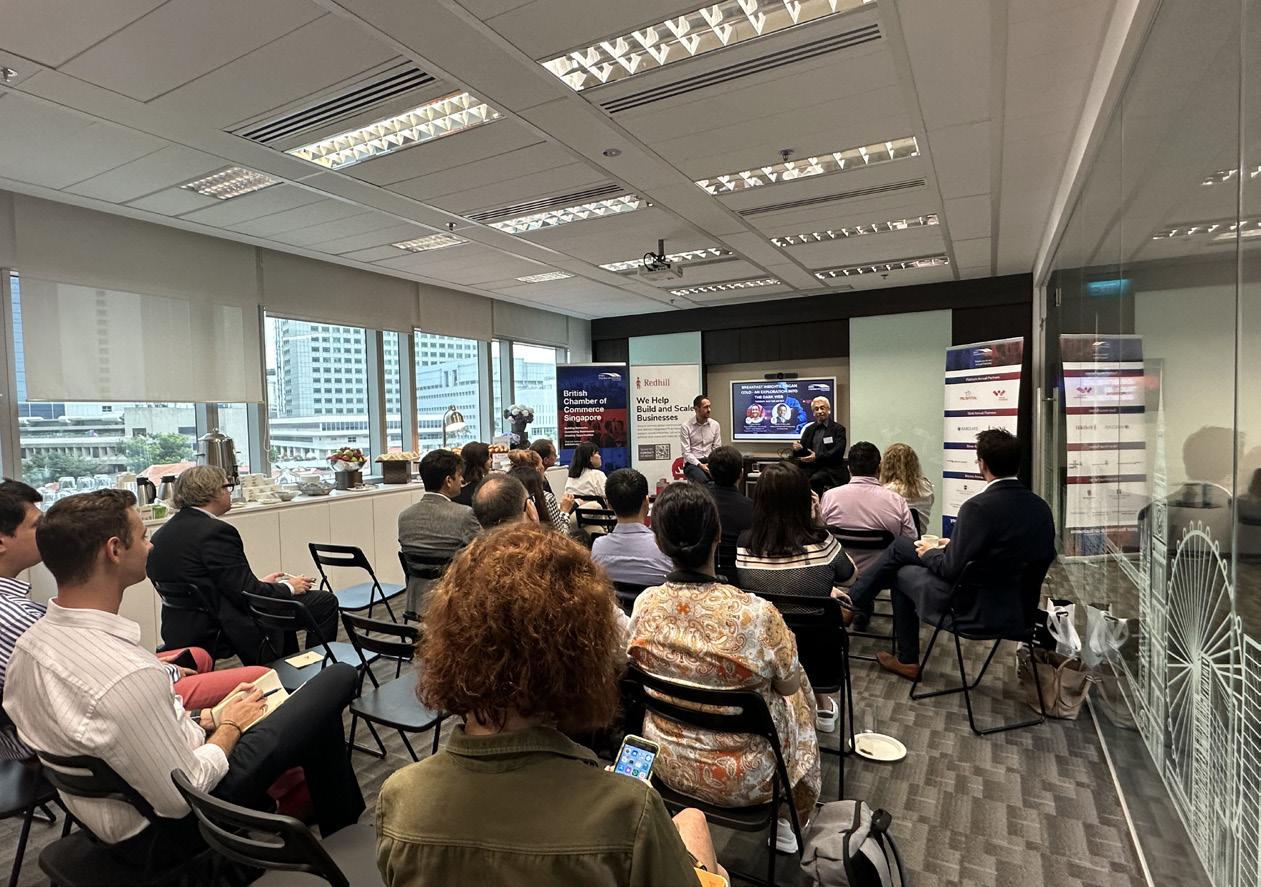
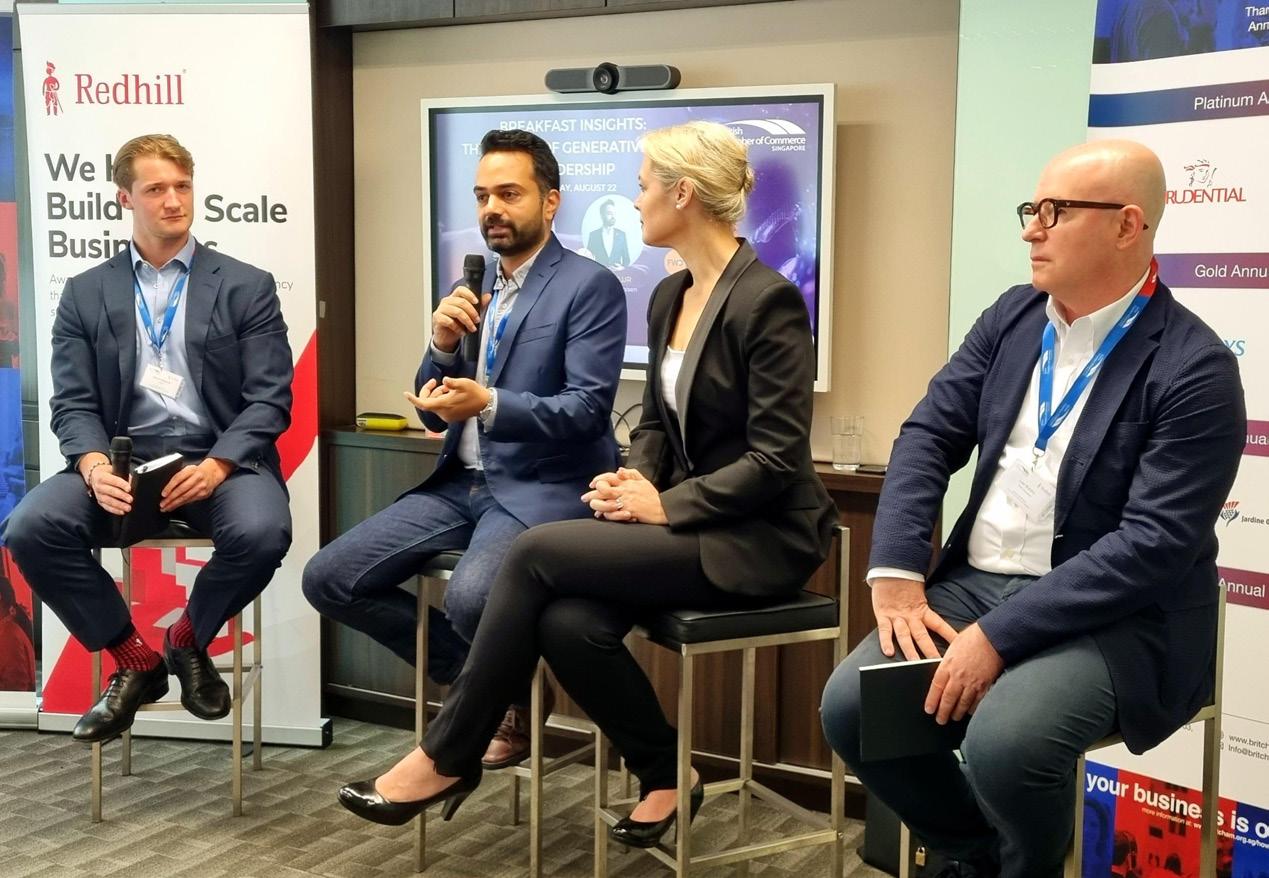
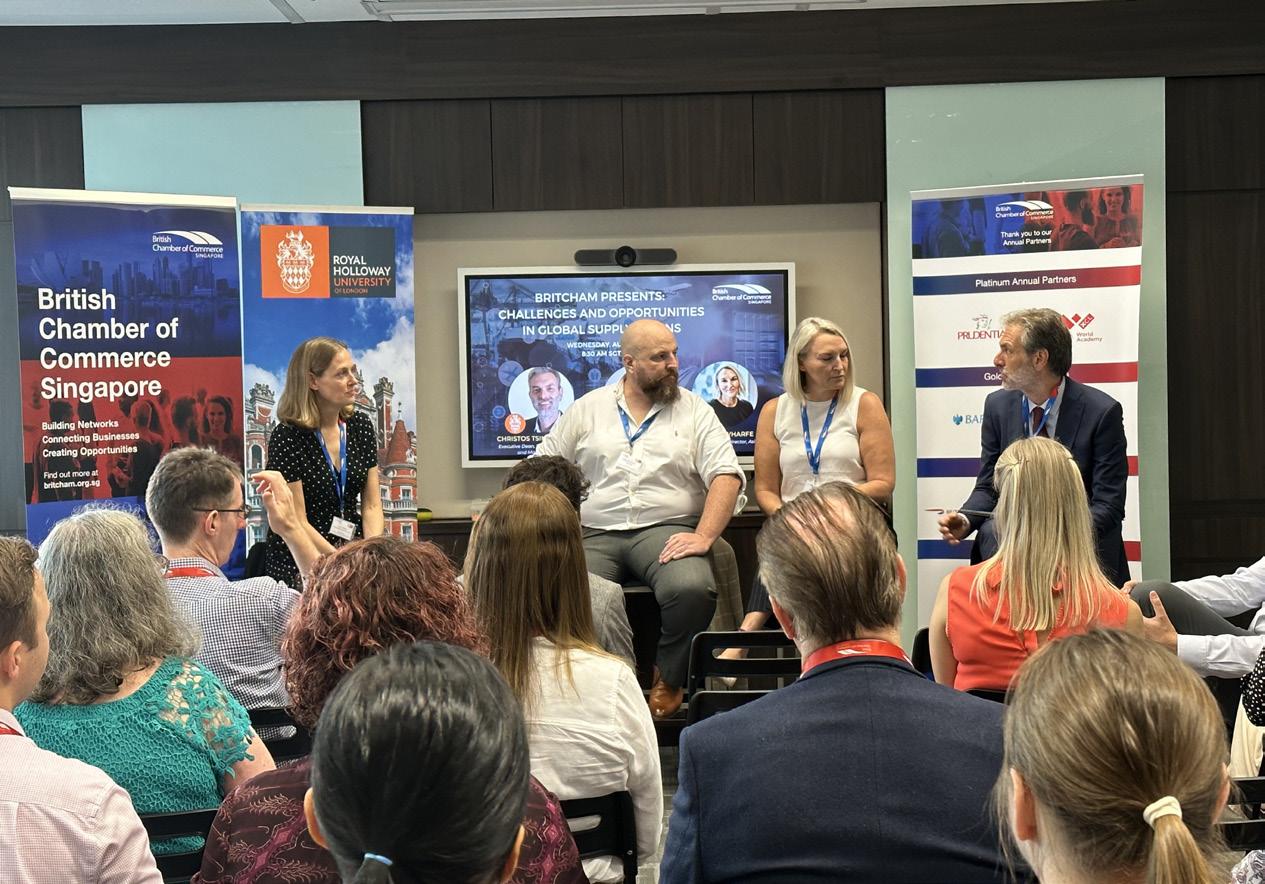

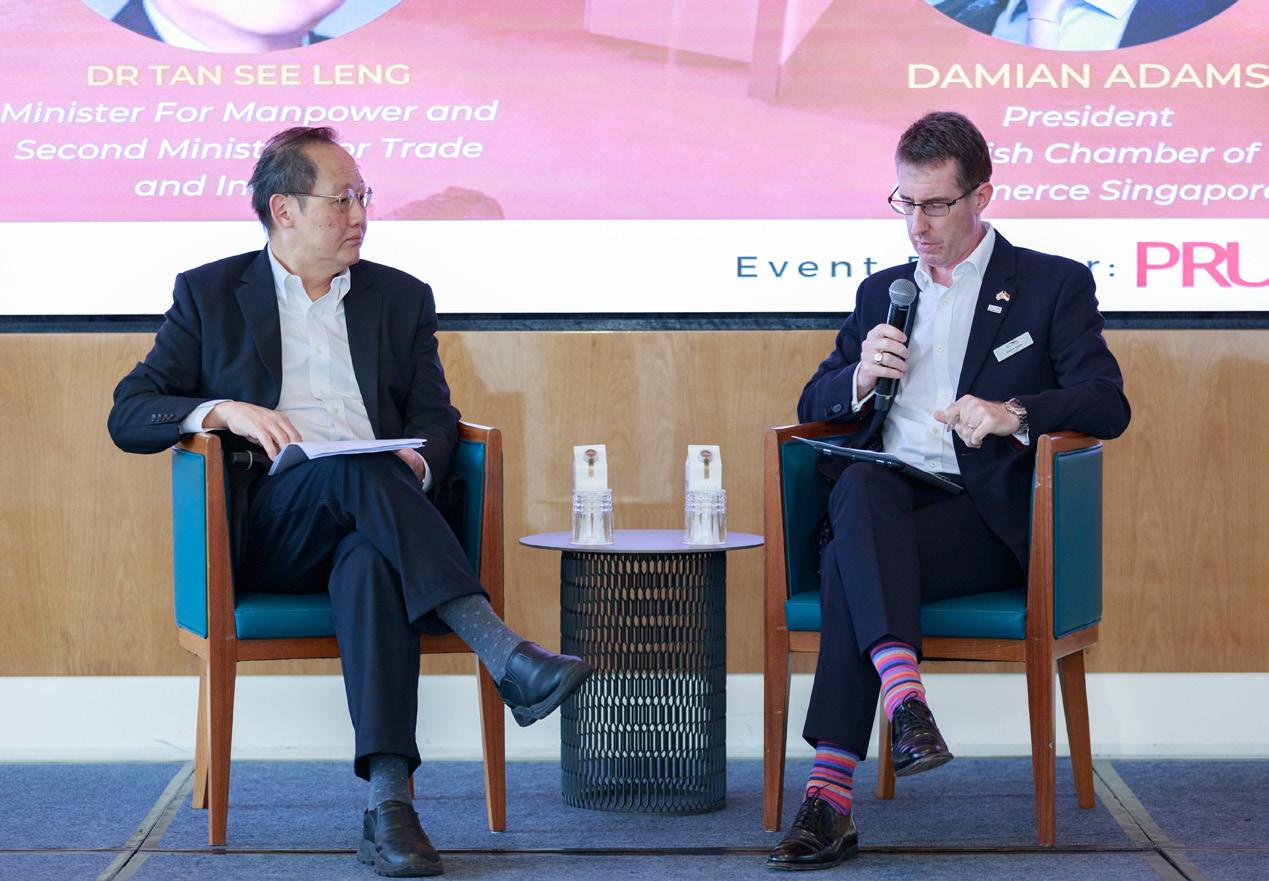
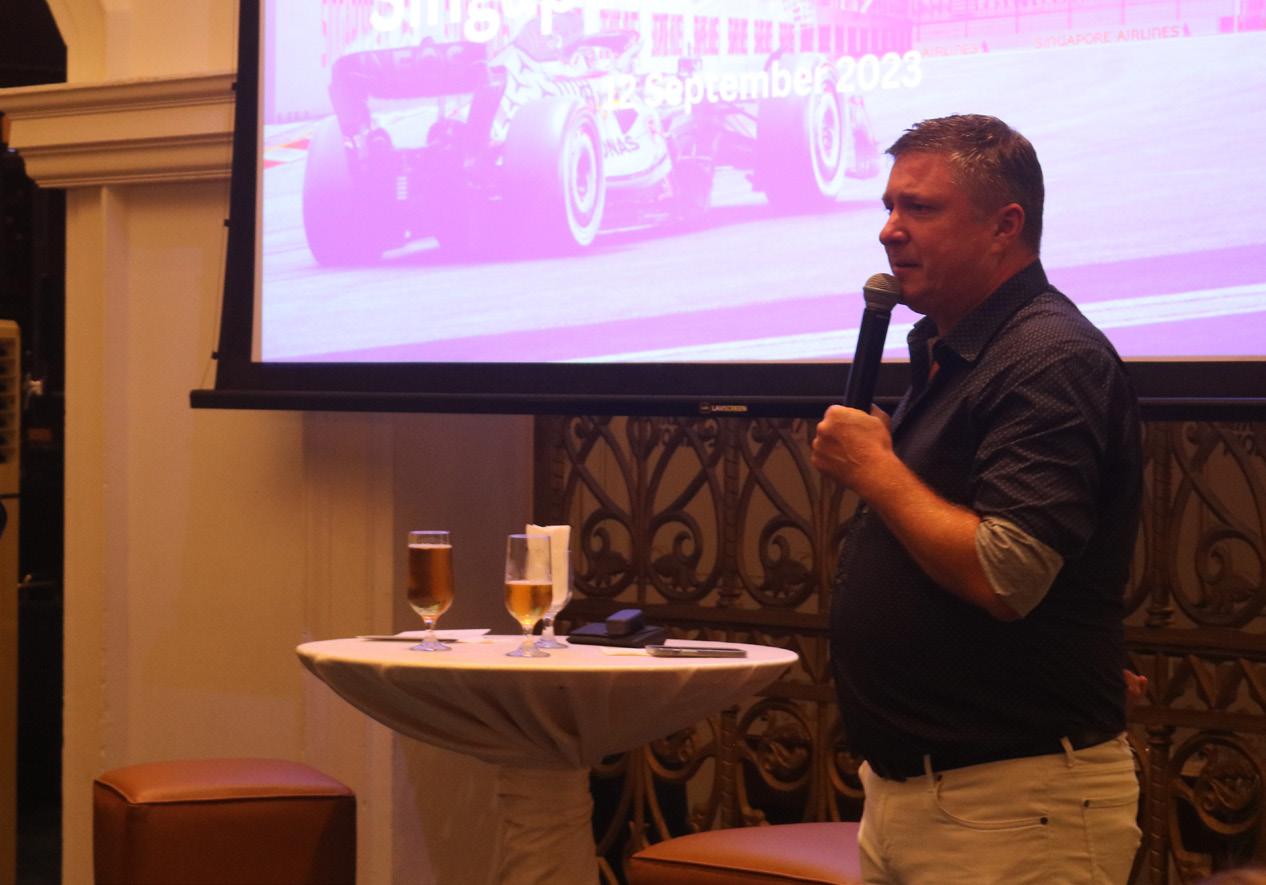 Breakfast Insights series event on the dark web and organ trafficking, August 2023
Breakfast Insights series event on the impact of generative AI on leadership, August 2023
Boardroom discussion on the challenges and opportunities in global supply chains, August 2023
The return of the Big Pub Quiz! August 2023
Our annual Member Dialogue with Minister for Manpower, Dr Tan See Leng, September 2023
Breakfast Insights series event on the dark web and organ trafficking, August 2023
Breakfast Insights series event on the impact of generative AI on leadership, August 2023
Boardroom discussion on the challenges and opportunities in global supply chains, August 2023
The return of the Big Pub Quiz! August 2023
Our annual Member Dialogue with Minister for Manpower, Dr Tan See Leng, September 2023
Issue 94 / September 2023 13 / orient-magazine.com
Celebrating Singapore F1 week with commentator and presenter David Croft (Crofty), September 2023
WELCOME TO OUR NEW MEMBERS
The Chamber continues to welcome exciting new member companies to our network. To contact them visit the Membership Directory on our website or reach out to our team.
LONDON SCHOOL OF BUSINESS & FINANCE SINGAPORE
Supported by the London School of Business and Finance (LSBF) in the UK and the royal patron, HRH Prince Michael of Kent GCVO, LSBF in Singapore has been operating since 2010. Awarded for its Excellence in Curriculum and Assessment at the EducationInvestor Asia Awards 2018, LSBF in Singapore equips students with the requisite knowledge and skills through six unique learning entities – School of Professional Education, School of Business, School of Hospitality, School of English, Chinese Business Department, as well as Executive Development & Online Unit.
Visit www.lsbf.edu.sg for more information.
FUEL VENTURES ASIA
Fuel Ventures, the London-based Venture Capital fund, launched Fuel Ventures Asia in July 2023, a lab center to serve as a launchpad for selected portfolio companies to enter the Asia market. The center is poised to act as a crucial hub for five to seven select portfolio companies, supplying them with indispensable resources to fuel growth and amplify their footprint within the Asian market. These companies are high performing portfolio companies who have demonstrated strong results in Europe.
Visit www.fuelventures. asia for more information.
HARLEY STREET HEART & VASCULAR
The Harley Street Medical Group is a Singapore based group of medical specialists comprising of multi-disciplinary specialist centres, providing the latest and most advanced treatments for cardiovascular disease and cancer. Their internationally recognised specialists have trained in leading centres around the world, including the UK, USA, Canada and Australia to deliver a caring and professional service for patients. They aim to maintain the medical excellence and qualities associated with the Harley Street name and believe in treating the individual and not just the disease. Collaborating with leading medical centres and specialists worldwide allows international patients to enjoy a smooth continuity of care when they return home.
Visit www.harleystreet.sg for more information.
AUSTRALIAN VINTAGE LIMITED
Australian Vintage Limited is an Australian public company that operates within the wine production industry. They boast a dynamic and award-winning portfolio of global brands, with a focus on bringing innovative products to market and being ahead of the curve on key consumer trends including emerging varietals, the burgeoning no/low-alcohol wine category and ready-todrink products.
Visit www.australianvintage.com.au for more information.
MEMBER PROFILES /
MEMBER PROFILES Issue 94 / September 2023 14 / orient-magazine.com
ASENDIA SINGAPORE PTE LTD
Asendia is a cross-border delivery service for international e-commerce and mail. A joint venture of French La Poste and Swiss Post since 2012, the company acts under the brand “Asendia” and has 32 global locations in 4 continents, delivering worldwide. The business handles all aspects of international e-commerce and mail logistics, including delivery, customs, fulfillment and returns. Asendia is owner of ESW (formally eShopWorld) after acquiring full ownership in 2021. The company is also an investor in Anchanto, a market leader in e-commerce technology in Asia.
Visit www.asendia.sg for more information.
COLT TECHNOLOGY SERVICES PTE LTD

Colt Technology Services (Colt) is a global digital infrastructure company which creates extraordinary connections to help businesses succeed. Powered by amazing people and like-minded partners, Colt is driven by its purpose: to put the power of the digital universe in the hands of its customers, wherever, whenever and however they choose. Since 1992, Colt has set itself apart through its deep commitment to its customers, growing from its heritage in the City of London to more than 60 offices around the world. The powerful Colt IQ Network connects 222 cities and 32 countries with more than 1000 data centres, 51 Metropolitan Area Networks and over 31,000 buildings across Europe, Asia and North America’s largest business hubs. Privately owned, Colt is one of the most financially sound companies in the sector. Obsessed with delivering industry-leading customer experience, Colt is guided by its dedication to customer innovation, by its values and its responsibility to its customers, partners, people and planet.
Visit www.colt.net for more information.
DEGE & SKINNER
Established in 1865 and still impressing with bespoke tailoring and shirt-making, Dege & Skinner is one of Savile Row’s finest bespoke tailors and shirt-makers. Demand for their bespoke tailoring and bespoke shirt-making services is such that they also host various Trunk Shows. The regularly visited locations include Scotland, the USA, Switzerland, France, Germany, Japan, Hong Kong, Singapore and the Middle East.
Visit www.dege-skinner. co.uk for more information.
THINK & GROW
Empowering founders, leaders and executives across the globe to develop their businesses and people to build legacies and play a key role in the future of work.
Visit www.thinkandgrowinc.com for more information.
SCAYLER
Helping B2B software companies scale their revenue faster and more efficiently through selling on marketplaces.
Visit www.scayler.com for more information.
NEW MEMBERS
INSPIRATION FROM THE TOP
“The elevator to success is out of order. You’ll have to use the stairs... one step at a time.”
 - Joe Girard, legendary salesman, motivational speaker, and author
- Joe Girard, legendary salesman, motivational speaker, and author
INSPIRATION
FOR THE BOOKSHELF
INSPIRATION / THE CONTENT MIX
Popular or recommended content to support your business and personal skills development, helping to generate new ideas for your business and team.
THE MAKING OF A MANAGER: WHAT TO DO WHEN EVERYONE LOOKS TO YOU
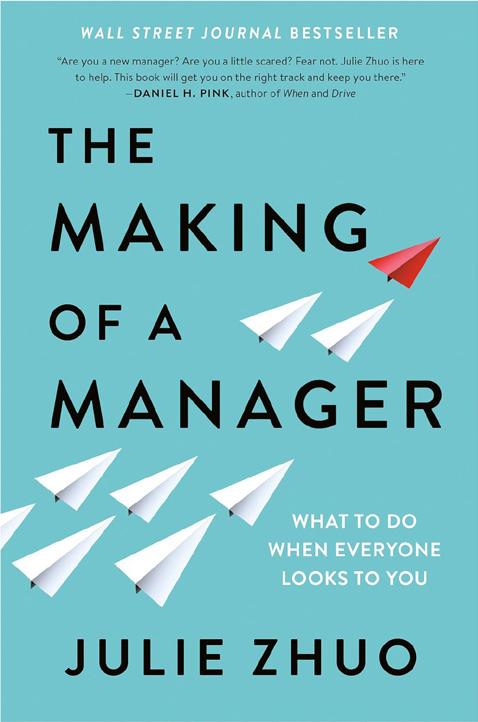
Julie Zhuo felt unsure when she became a rookie manager at the age of 25. She stared at a long list of logistics and faced a thousand questions and uncertainties. Now, having managed dozens of teams spanning tens to hundreds of people, Julie knows the most important lesson of all: great managers are made, not born. This is a modern field guide packed with everyday examples and transformative insights.
BUSINESS PODCASTS

NUDGE: BEHAVIOURAL SCIENCE SIMPLIFIED

FOUR THOUSAND WEEKS: TIME MANAGEMENT FOR MORTALS
Drawing on the insights of both ancient and contemporary philosophers, psychologists, and spiritual teachers, Oliver Burkeman delivers an entertaining, humorous, practical, and ultimately profound guide to time and time management.
Ever noticed how the smallest changes can have the biggest impact? On Nudge, you’ll learn simple evidence-backed tips to help you kick bad habits, get a raise, and grow a business. Every bite-sized 20-minute show comes packed with practical advice from admired entrepreneurs and behavioural scientists. Nudge is fast-paced but still insightful with real-world examples that you can apply - this is not your average business podcast.
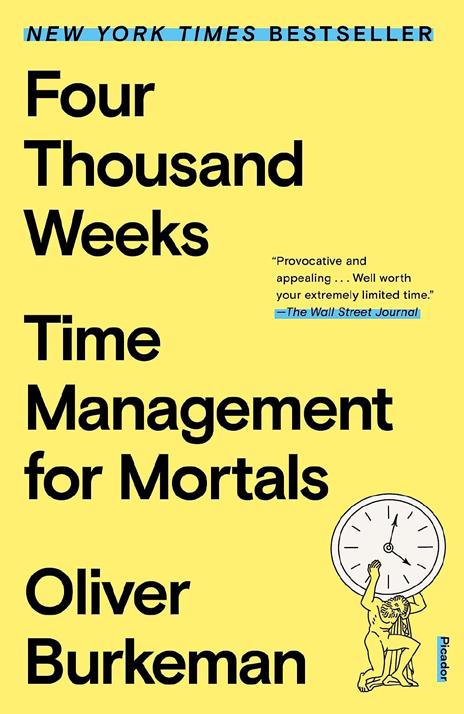
Issue 94 / September 2023 17 / orient-magazine.com
IN FOCUS: NATALIE BLACK CBE, THE FIRST TO HOLD THE ROLE OF HIS MAJESTY’S TRADE COMMISSIONER FOR ASIA
― In this special edition of our regular In Focus interview, Executive Director David Kelly sits down with Natalie as she completes her term in the role.
As the first HMTC for APAC, how has the role evolved during your tenure in the region?
It’s been my privilege to serve as the first His Majesty’s Trade Commissioner for Asia Pacific. Based in Singapore, I’ve had the opportunity to get to know the local and regional business community that live here and I am very grateful to the Chamber for all their support to my role and me personally. Damian, Bicky, David and all the Board members have kept me on the straight and narrow over the last five years!
I started the role shortly after the UK left the European Union with a clear mandate to be as ambitious as possible in our trade and investment relationships across the Asia Pacific as part of the UK’s broader strategic tilt to this region. Despite a global pandemic and the inevitable flux of politics, we have delivered more than we ever hoped thanks to the support

of UK business in the region – particularly here in Singapore. Our trading relationship with the region is now worth over £119 billion with the foundations to grow even further. UK exports to the region are at a record high, amounting to £63.3 billion in 2022. The UK currently exports more to Asia Pacific than the Middle East, South Asia and Africa combined. Asia Pacific is also the largest regional source of investment into the UK outside North America and Europe, topping £125 billion of Foreign Direct Investment from Asia Pacific to the UK in 2021.
Free Trade Agreements have been a major focus. Building on continuity agreements including the one with Singapore, the UK has signed its first new ones in the region –Japan, Australia and New Zealand. But we have also recognised the benefits of these can take a while to be realised and so we established the UK’s first ever overseas Market Access hub to target specific trade barriers. It has resolved more than £600 million worth of barriers over five years, across life sciences, offshore wind and food and drink.
The importance of multilateralism and supporting the rules-based international order has also become increasingly important in light of global uncertainty. The Chamber played a key role in helping the UK to become ASEAN’s first new Dialogue Partner for 25 years in 2021 and the first new member of the Comprehensive and Progressive Agreement for Trans-Pacific Partnership (CPTPP) – a £12 trillion trade bloc worth over 15% of global GDP. The voice of business - via the Chamber - is essential in ensuring these partnerships work for UK business and in demonstrating the value the UK brings to the region.
Where do you see the key opportunities for UK business in the region?
Asia Pacific is at the heart of global growth and provides a range of opportunities for UK companies from infrastructure to life sciences. The Department for Business & Trade Team based in the British High Commission and led by Steve Firstbrook, is particularly focused
IN FOCUS INTERVIEW Issue 94 / September 2023 18 / orient-magazine.com
on digital and tech, green growth and maximising the usage of the UK-Singapore FTA.
More broadly in the region, we are focused on inward investment and seven sectors including technology, infrastructure, financial services, defence, life sciences, sustainable energy and education. This reflects the diversity of the region and the range of UK expertise. But we are also seeing increased collaboration opportunities across sectors, for example leveraging the strength of UK tech in life sciences and financing of green energy projects. The UK-Singapore Green Economy Framework will support this – bringing together elements of climate and trade to support export opportunities and help achieve national decarbonisation targets.
On a personal note, I have focused my efforts on increasing awareness of UK capability in technology. We have one of the world’s top tech sectors, worth over $1 trillion with over 160 unicorns. As a horizontal, it enables so much of the UK’s expertise, which is why we launched the UK’s first Digital Trade Network here in Asia Pacific. The network has gone on to support over 500 companies and 85 UK scale-ups. A real highlight of this year was to welcome over 650 investors, entrepreneurs and researchers from across APAC to London Tech Week, including a fantastic delegation from Singapore.
How has the British Chamber of Commerce network across the region supported your role and how do you see this developing going forwards?
The British Chamber of Commerce network is an incredible resource of support (and challenge!). It ensures we can talk to UK businesses directly in market and we can work hand in hand to make the most of the opportunities while tackling the challenges together. The Chamber in Singapore has supported a large number of official visits, including our Permanent Secretary of the Department for Business and Trade Gareth Davies and our Prime Minister’s Trade Envoy to Singapore Lord Sarfraz.
The value of the Chambers was particularly clear during the pandemic. With travel increasingly challenging, they were an important temperature check of how UK business were feeling and key feedback loop to governments in the
region as we worked together to get back to ‘the new normal’.
Cross-Chamber cooperation under the umbrella of “Britain in South East Asia”, BiSEA, has a particularly important role to play in the region. As our relationship with ASEAN matures, they will be key to ensuring we realise the benefits of this partnership for UK businesses on the ground. Working together across borders, they offer an important perspective and a new way of collaborating that will really make a difference.
What have been the main highlights over the last five years?
There are so many highlights, it’s difficult to pick only a few but it was fantastic to see the Secretary of State Kemi Badenoch sign CPTPP in Auckland earlier this year. So many people had worked so hard to make that happen so it
was a big moment to see the UK become the first new member of this important trading bloc worth over £340 billion.
Another highlight was representing the UK at the first in-person UK-ASEAN Economic Ministers meeting since the UK became a Dialogue Partner. As the UK’s first Senior Economic Official, I was proud to see our first-ever joint economic workplan agreed after leading the negotiations with ASEAN in Jakarta and Siem Reap with the brilliant team from the UK Mission to ASEAN.
In Singapore, I think the signing of the Digital Economy Agreement with Singapore was really special. It is the first trade deal of its type we have signed anywhere in the world and shows how the UK and Singapore have a uniquely innovative relationship. The Chamber is now playing an important role putting it into action and it was

IN FOCUS INTERVIEW Issue 94 / September 2023 19 / orient-magazine.com
BritCham Executive Director with HM Trade Commissioner for Asia Pacific, Natalie Black CBE
great to have two members join me (Andrew McKeown and Carl Hemus) at TechSauce in Bangkok to share more about what we are doing together.
What next for the UK following the CPTPP, DEA and other agreements that you’ve been instrumental in delivering for the UK?
Our focus is now relentlessly on implementation and delivery. Our membership of CPTPP will enter into force after it has been ratified through Parliament, and other members have completed their own legislative processes. UK businesses will then be able to trade with CPTPP members on preferential terms, using either CPTPP or any existing bilateral agreement.
The Digital Economy Agreement with Singapore entered into force in 2022, and we’re already seeing businesses take advantage of it. In particular, it was fantastic to see three members of the British Chamber of Commerce Singapore: LogChain, Hurricane Commerce and TMX Global Singapore, sign an agreement earlier this year to support the digitalisation of trade, supply chains and logistics.
The DEA’s world-class provisions on key aspects of the digital economy such as data, artificial intelligence, financial services, digital identities, and legal technology make it easier for companies to trade digitally with Singapore, and the Agreement was designed to continue to deliver meaningful outputs for business long after signature. We will continue to
work closely with BritCham Singapore and departments across the Singapore Government to drive forwards the implementation of the agreement.
What are your future plans?
In September, I will be returning to the UK and I hope to stay in touch with many members of the Chamber. Please look me up when you are in London!
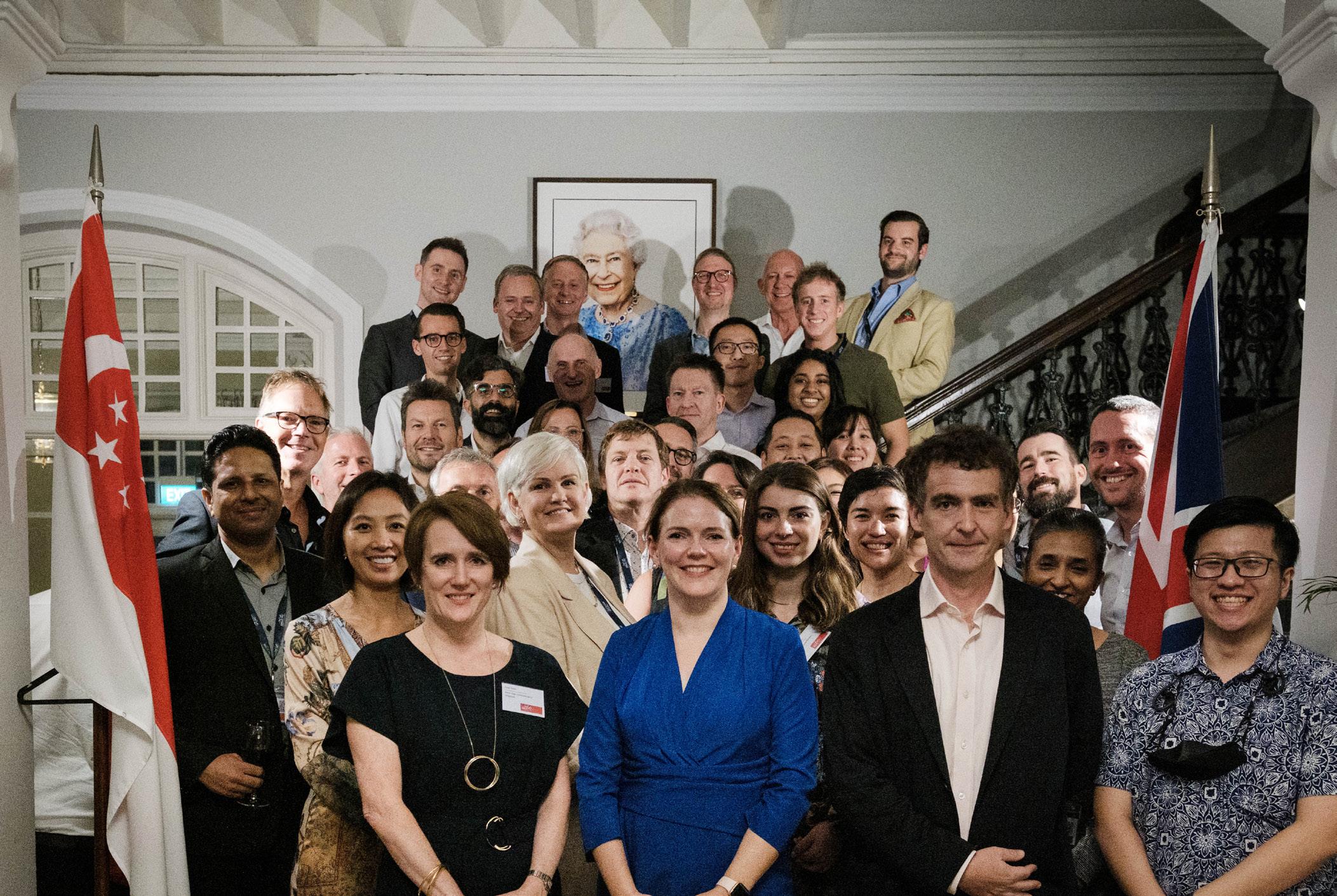
Issue 94 / September 2023 20 / orient-magazine.com IN FOCUS INTERVIEW
/ BRITISH BUSINESSES SIGNAL THEIR CONTINUED CONFIDENCE IN SINGAPORE BUT RAISE CONCERNS OVER THE CURRENT BUSINESS CLIMATE, SPECIFICALLY TALENT AND INCREASING COSTS
The results of our latest Business Sentiment Survey were published in The Straits Times newspaper earlier this month.
Remaining positive for the future, with over three-quarters of businesses confirming their confidence in Singapore as a business hub for the long-term, satisfaction in today’s business climate was split with a near 50-50 result. Despite a challenging period for hiring, retaining staff and balancing budgets, companies reported several positives. Interest in ASEAN remains a priority for the majority of members and the aggregated average proportion of Singaporean citizens and permanent residents among the respondents is 68%. There is strong awareness of the incoming Complementarity Assessment Framework (COMPASS) for employment passes (over 70%), with 54% of respondents agreeing with the aim that it will help to ensure a high quality and diverse foreign workforce which complements the local workforce.
Mirroring the Singapore Business Federation’s National Business Survey results earlier this year, availability and retention of manpower appear in the top three concerns, alongside increasing costs to businesses. In talent, 85% of members have been actively recruiting in the past six months, yet salary expectations, the competitive market for local talent
and a perceived lack of requisite technical skills and expertise has increased the difficulty of finding the right talent. Members shared their observations of skills gaps in critical thinking, business acumen and technical skills at an industry level.
On retaining talent, similar issues of salary expectations rank high in concern and were the top reason for employees leaving respondents’ companies this year, with talent appearing as the top cost challenge in the current business environment. Younger generations of employees, particularly those in the millennial and Gen Z generations, are proving to be a challenge to retain. It is important to note that these issues are not unique to foreign-owned businesses, particularly cost and talent pool challenges, as seen in the SBF National Business Survey.
In each sentiment survey, BritCham reviews key benchmark questions on business growth. In this latest edition, each of the benchmarks around sales, advance orders, cashflow and investment plans showed a small balance contraction (i.e. the percentage of firms that reported an increase minus the percentage that reported a decrease).
David Kelly, our Executive Director, commented:
“Our bi-annual sentiment survey always provides us with a snapshot of the business outlook and allows us to build upon the regular feedback that we receive as a Chamber throughout the year. With around 80% of companies reaffirming their confidence in Singapore as a business hub, we will continue to support businesses who are looking to expand into Singapore and across the ASEAN region.
With hiring and retaining talent remaining as two of the top three challenges for businesses, we will continue to work with our member companies to maintain a dialogue and share best-practice from across our network on the topic of talent.”
ABOUT THE RESEARCH
The Business Sentiment & Workforce Survey ran from the period 15th-29th August and represents the breadth of our membership across smaller and medium sized businesses in multiple industries within Singapore. Read the highlights in full here.
COMMENTARY
COMMENTARY
Issue 94 / September 2023 21 / orient-magazine.com
CELEBRATING 50 YEARS OF BARCLAYS IN SINGAPORE

This year, Barclays is proudly celebrating a significant milestone – its 50th anniversary in Singapore. Since its establishment in the heart of Southeast Asia back in 1973, the bank has grown from strength to strength to become one of the leaders in corporate and investment banking, global markets and private banking in the region. Beyond its commercial success, Barclays has created a supportive and inclusive environment through its vibrant Employee Resource Groups (ERGs) – enabling all colleagues to feel comfortable bringing their whole selves to work and feel empowered to thrive in their personal and professional lives. Read on to learn more about Barclays’ ERGs and how they have contributed to Barclays’ success in Singapore.
WORKING FAMILIES RESOURCE GROUP
The Working Families Resource Group (WFRG) is part of Barclays’ Multigenerational agenda, and aims to make Barclays the employer of choice for working families by providing a supportive network for Barclays colleagues who are parents, parents-to-be or carers as they balance the challenges of family, life and work. The WFRG run regular speaker events, webinars and seminars for colleagues, and share useful information on working family-related topics. The WFRG also partners closely with Human Resources – some key successes from this partnership are implementing gender-neutral parental leave policies and Bring Your Child to Work Day, which is a popular initiative among colleagues.
EMBRACE, THE MULTICULTURAL RESOURCE GROUP
The Multicultural Resource Group (or “Embrace”) supports diversity and inclusivity across all cultures, faiths and people. Embrace’s vision is to celebrate and enable all colleagues to thrive in a multicultural environment, as well as make a positive impact in the wider community.
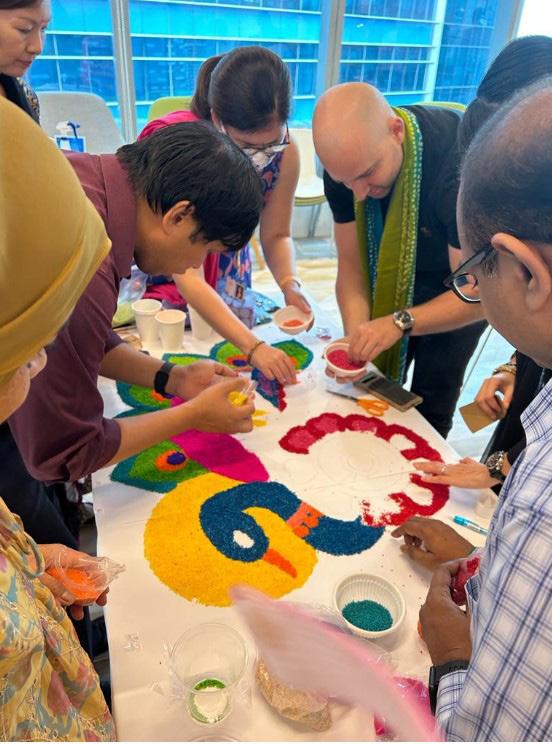

Throughout the year, Embrace organises events to celebrate various cultural holidays such as Lunar New Year, Hari Raya and Deepavali. Through panel discussions, games and food tasting sessions, colleagues can gain deeper insights into different cultures around the world. Barclays marked World Day for Cultural Diversity in May with a global flagship event across its various locations. Colleagues can participate in activities and learn more about topics such as how culture influences mental health. Embrace also actively partners with various charities in Singapore to promote its cultural diversity and inclusion agenda, most recently raising funds to support a Malay orphanage.

MEMBER PROFILE /
MEMBER PROFILE Issue 94 / September 2023 22 / orient-magazine.com
Lunar New Year 2023
Hari Raya 2023
Deepavali Celebrations
“Singapore is a cultural melting pot, a place where people of different ethnicities and cultures call home. At Barclays in Singapore, our colleagues come from all around the world, making our organisation a truly vibrant and diverse environment. As Barclays celebrates 50 years of success in Singapore, we will continue to champion and embrace inclusivity of all races, faiths and cultures in the workplace and community.”
Joanne Chan (she/her), Chief Financial Officer APAC & Executive Sponsor for Barclays APAC Multicultural Agenda

REACH, THE DISABILITY, MENTAL HEALTH & NEURODIVERSITY RESOURCE GROUP
As a founding member of the ‘Singapore Business Network On DisAbility’ in 2015, Reach Singapore is committed to making Barclays the most accessible and inclusive bank for its clients, partners and colleagues. Reach’s agenda focuses on disability, mental health and neurodiversity. Some key highlights include:
• Fundraising through the annual Charity Quiz with a total proceeds of over S$100,000 donated to Autism Association Singapore, Dementia Singapore and Dyslexia Association of Singapore from 2015 to 2019; Reinforcing awareness through the celebration of the abilities of persons with special needs at The Purple Parade 2019

• Community engagement at the Singtel Carnival 2019 and 2022, Singapore’s largest event dedicated to children with special needs

• External collaborations with various Charity Partners: Home Nursing Foundation, Movement for the Intellectually Disabled of Singapore, Muscular Dystrophy Association Singapore, Singapore Association for the Deaf, TomoWork
SPECTRUM, THE LGBT+ RESOURCE GROUP
Launched in Singapore in 2011, Spectrum is open to all colleagues, regardless of sexual orientation or gender identity. Spectrum’s key workplace achievements include partnering with HR to introduce the Transitioning at Work guidelines and LGBT+ inclusive employee benefits. This year, the network has held two marquee events to raise for the LGBTQ+ community in Singapore:
International Day Against Homophobia, Biphobia and Transphobia (May 2023)
• In recognition of the intersectionality between gender and LGBTQ+ issues, the network organised a coffee appreciation workshop to raise funds for T Project , the first and only social service and shelter for the transgender community in Singapore
• The initiative raised close to S$9,390 to support the transgender community with transport, food and housing needs
PRIDE Month (June 2023)
• To celebrate June Pride month in Singapore, Spectrum distributed pride-themed cupcakes, temporary sticker tattoos and limited-edition Barclays rainbow logo t-shirts
• Colleagues donated to LGBTQ+ organisations such as T Project, Action for AIDS Singapore and Oogachaga

CELEBRATING 50 YEARS OF BARCLAYS IN SINGAPORE Issue 94 / September 2023 23 / orient-magazine.com
Purple Parade 2019
Singtel Carnival 2022
Pride month fundraiser 2023
WIN, THE GENDER RESOURCE GROUP AND EMERGE, THE EARLY CAREERS RESOURCE GROUP
Win is the Gender Resource Group that aims to engage all genders across the organisation to attract, develop, promote and retain cisgender and transgender women at all levels of Barclays. It partners with other ERGs to drive diversity and inclusion, and break down power imbalances, discrimination and inequality. Win creates spaces to drive role model behaviour where men can share opportunities, celebrate accomplishments and offer sponsorship and visibility. Win is also a longstanding partner and corporate member of the Financial Women’s Association (FWA) of Singapore. Emerge is the Early Careers Resource Group that promotes multigenerational inclusivity and upskilling emerging talent by enabling cross-generational relationships.
Emerge Brighter, Win Together
In celebration of Barclays’ 50th anniversary, Emerge SG partnered with Win SG to launch its flagship Reverse Mentoring Programme in Singapore earlier this year, successfully matching 25 mentor-mentee pairs. Reverse Mentoring flips traditional mentoring by creating opportunities for senior leaders to be mentored by junior colleagues in the bank, to gain fresh insights and different perspectives to help shape their leadership style for future generations. The junior colleague is also able to benefit from the engagement by building visibility with senior management and gaining valuable tips and advice for career and personal development. During the launch event, mentor-mentee pairs met for the first time, and discuss desired objectives for the six-month mentoring relationship. The initiative demonstrates Barclays’ commitment to deepening engagement, connecting colleagues across all corporate levels and developing careers.


“Making Barclays a great place to work goes beyond the workplace – it is equally important to support colleagues of all life stages to flourish in their personal and professional lives. The Working Families ERG has been key to advocating and effecting positive changes for colleagues balancing family, life and work.”
Samuel
Lim
(he/him), Senior Relationship Manager APAC & Executive Co-Sponsor for

Barclays APAC Multigenerational Agenda
“Barclays’ goal is to be an employer of choice for all generations. Our aim is to cultivate a multigenerational environment where colleagues of all stages in life feel confident to bring their unique experiences to work. Our ERGs are the driving force of this agenda – pushing for more supportive workplace policies, as well as connecting senior and junior colleagues across the bank.”
― Yun Zhang (she/her), Head of Macro Trading, APAC, Global Head of MTN & Structured Notes Trading and Global Co-Head of Hybrids Trading, APAC Executive Co-Sponsor of the Multigenerational Agenda Multigenerational Agenda

MEMBER PROFILE Issue 94 / September 2023 24 / orient-magazine.com
Win and Emerge’s flagship Reverse Mentoring Programme
ENVIRONMENT NETWORK

Barclays’ environment networks play a critical role in supporting our goal to become a net zero bank by 2050. The network educates colleagues on the unique challenges and nuances of climate change, while also actively contributing to the core business objectives to ensure the bank makes the right business decisions for its clients, colleagues and communities. Barclays was the first bank to establish a global Sustainability Impact Investment Banking group back in 2019.
BE WELL CHAMPIONS

Barclays is committed to giving colleagues the tools and support they need to be their best self. The Be Well programme is a wellbeing initiative that provides colleagues the resources and tools to best care for their physical and mental health. From tailored expert guidance to events, Be Well is a one stop shop to support Barclay colleagues in meeting their personal and professional goals. Be Well champions are Barclays colleagues who champion health and wellbeing across their teams and networks.
GRADUATE, APPRENTICE, INTERN NETWORK (GAIN)

GAIN is the network for Barclays graduates, apprentices and interns, open to current and past early career programme colleagues. First created in September 2021, GAIN is a vibrant global community that hosts exciting events, shares inspiring content and helpful online tools to help young colleagues build their knowledge and network. The community serves as a platform to connect and share the opportunities that Barclays has to offer and support junior colleagues in their career progression.
“The Barclays Singapore ERGs work tirelessly to drive the Diversity, Equity and Inclusion agenda across the bank. I’ve seen first-hand how effective the ERGs are in promoting awareness, creating internal networks and supporting individuals across all the pillars of DEI. Our colleagues’ passion and dedication are an inspiration to us all, and they make our workplace a more equitable, diverse and fun place to be. As we celebrate our 50th anniversary, we still have a lot of work to do but we should be proud of the success that we’ve had and I look forward to seeing more progress on our DEI agenda in the years ahead.”
Andrew Ashman (he/him), Barclays’ Head of Loan Syndicate, Asia Pacific & Chair for BritCham’s Diversity and Inclusion Committee

CELEBRATING 50 YEARS OF BARCLAYS IN SINGAPORE Issue 94 / September 2023 25 / orient-magazine.com
Beach cleanup 2022
Be Well Champions
Barclays graduates
ROAD
TO NET ZERO
/ THE POWER OF STORYTELLING TO DRIVE SUSTAINABLE CHANGE

How using traditional storytelling techniques can help us inspire, motivate and encourage sustainable change.
by Suzy Goulding Head of Sustainability, APMEA, MSL Group
ROAD TO NET ZERO
“The best arguments in the world won’t change a single person’s mind. The only thing that can do that is a good story.” This quote from ‘The Overstory’, a novel by Richard Powers, really sums up the power a story can wield, particularly when we are trying to communicate challenging issues. The book is about nine Americans whose unique life experiences with trees bring them together to address the destruction of forests. Powers was inspired to write the work after he encountered giant redwood trees for the first time.
Sustainability is everywhere but still misunderstood, misperceived and often overwhelming. For many, it presents a set of unconquerable challenges and uncomfortable levels of change to our everyday lives. Add to that the fact that the word of sustainability is full of acronyms, complex data and often dry facts and figures – all of which are important but not exactly engaging or motivating. Maybe the way to win over hearts and minds and inspire us all to live more sustainable lives is to harness the power of storytelling. Everyone loves a good story, so it makes sense that by using storytelling techniques when communicating around sustainability issues we have a better chance of inspiring change.
Stories engage us by creating empathy and connection with the characters and what they go through, experiencing universal emotions such as joy, fear, sadness or hope. It is this emotional connection that helps us remember stories and be impacted by them. Stories can shape beliefs, attitudes, and behaviours by appealing to our emotions, values and personal experiences, making us more receptive and open to accepting new ideas or perspectives.
Stories also play a fundamental role in shaping our identities and helping us make sense of the world. We often identify with characters in stories and find elements of ourselves reflected in their experiences. Through storytelling, we can explore themes of love, loss, conflict, and personal growth, which contribute to our understanding of ourselves and our place in society. Using stories to make big sustainability issues feel more relevant and personal to us can make us more open to considering new ways of living and adopting a new mindset.
Communicating sustainability through storytelling helps create an emotional connection with audiences. This is important because sustainability issues can often feel distant or abstract, but if we present a sustainability narrative as a story, perhaps by using real life examples and experiences, we have the power to evoke empathy and through empathy, encourage audiences to care about the issues we’re communicating on.
At the root of becoming a more sustainable society is the ability to encourage behaviour change, whether at an organisational or personal level. Storytelling has been proven to be an influential tool in motivating people to take action, and that’s because if we present relatable characters who face sustainability challenges and overcome them, the power of their stories can inspire people to adopt sustainable behaviours in their own lives.
Sustainability narratives often involve complex information and data, which can be overwhelming. Storytelling simplifies and packages this information into a digestible and engaging format. Facts and figures are still important but by weaving them into a story format, we make the information more accessible and memorable.
And finally, sustainability storytelling can help to build a sense of hope and empowerment. Many sustainability issues can seem overwhelming, leading to feelings of helplessness and apathy. Storytelling can counteract these negative emotions by highlighting success stories of individuals, companies and communities having a positive impact, demonstrating that sustainable change is possible and motivating individuals to become agents of change themselves.
So what makes an authentic sustainability story?
Rigour and research are key to developing your story. Ensuring you have strong proof points for the sustainability commitments and actions you’re communicating is essential if you want to ‘greenwash-proof’ your story. Getting internal buy-in is also important and seeking the views of employees from across your or-
“Using stories to make big sustainability issues feel more relevant and personal to us can make us more open to considering new ways of living and adopting a new mindset. ”
THE POWER OF STORYTELLING TO DRIVE SUSTAINABLE CHANGE Issue 94 / September 2023 27 / orient-magazine.com
ganisation in the development of your sustainability story will help to ensure its authenticity.
Consider your corporate purpose and values as a starting point for telling your sustainability story – this should answer the question of why you exist and what would the world miss if you didn’t? And what is important to you as a company from a value perspective? Ideally, your purpose and values should embody the sustainability issues that matter most to you and your stakeholders.

Transparency and honesty are also crucial if you want to build and maintain trust with your employees and external stakeholders. Sustainability is a never-ending journey and there will be hiccups along the way. The traditional story arc also has ups and downs so don’t be afraid to acknowledge when something has not gone quite to plan but also explain how you will get back on course.
The emotional connection, so powerful in good storytelling is so important here, to build a connection with your audience to help them see and understand why sustainability is important to your company and then perhaps compel them to action – whether that’s a change in mindset, behaviour, to advocate for change or ideally remain or become a new customer.
And then finally, there is a need to demonstrate through your sustainability story that you are here for the long run, however difficult it might become and that you are committed to long term impact.
As sustainability challenges continue to multiply, the need for us all to make or influence meaningful change grows ever more urgent. Using the power of storytelling to communicate these challenges is our best bet at helping to grow awareness, to educate and to hopefully encourage action.
ABOUT THE COMPANY
MSL Group is a global strategic communications network whose mission is to make every client more influential, because influence is the true force of change in the world. MSL Group is part of Publicis Groupe, the 2nd largest communications group in the world. Through a powerful alchemy of creativity and technology, we are driving business transformation across the entire value chain. Visit mslgroup.com for more information.
ROAD TO NET ZERO

PIGEONHOLES AND FALSE DICHOTOMIES: MODERN EDUCATION SHOULD FOCUS ON OPENING NEW DOORS FOR STUDENTS, BUT NOT AT THE EXPENSE OF CLOSING OTHERS
The key theme that can be consistently felt as one explores the findings of educational research through the decades, is that there is no ‘silver bullet’— no single best way to educate children. In some areas, this has led to exciting developments in pedagogical approach. All too often, though, the human need to structure and compartmentalise ourselves and our ideas has led to the creation of false dichotomies that we must work to dispel.
by Rob Earl, Senior Vice Principal, North London Collegiate School (Singapore)
There was a time in the not too distant past when lesson plans in schools all over the world contained the letters ‘VAK’. These stood for ‘visual’, ‘auditory’ and ‘kinaesthetic’ and were used to identify strategies used in class to cater for each of these types of learner. Teachers would create video, image or diagram-based resources for their visual learners, consider their language and soundscape for their auditory learners and meticulously craft practical activities for their kinaesthetic learners. What most did not realise at the time, and many still don’t, is that tailoring the method of instruction to an individual’s preferred ‘learning style’ does not improve learning. In fact, it often limits it.
However organised and structured each of us may feel we are, in truth our brains are messy. They are unimaginably complex
networks of interlinked thoughts, ideas and snippets of information collected through all five senses, often simultaneously. Consider, for example, a time when you smelled a particular scent, and it immediately conjured a picture in your mind’s eye of an event or person. Or the fact you can almost hear a song playing in your head if you read the lyrics or see a photograph of the band. These things happen because your brain’s ability to retain information is magnified when more than one of your senses is stimulated and more neural connections can be made as a result. Focusing on one particular ‘learning style’ for an individual can actually make it harder for them to commit things to their long-term memory, not easier.
In many modern schools there is an increasing focus on evidence-based teaching, where the strategies used in the classroom are informed by educational research. Rather than tailoring their resources to the preferred learning style of the student, teachers in these schools tailor them to the content and the context of the lesson and employ ‘dual coding’. This seeks to ensure that multiple senses are stimulated at the same time, for example by combining words with an image or a diagram to help the brain to form the necessary connections for long-term retention.
Sadly, though, the neuroscientific ‘myth’ of learning styles persists. Surveys have shown that the vast majority of those within and outside of the education profes -
SECTOR INSIGHTS /
SECTOR INSIGHTS Issue 94 / September 2023 30 / orient-magazine.com
sion still believe that they and/or their students will learn better if information is presented in their preferred method, despite what cognitive scientists have known for decades.
It is not just ways of learning that are needlessly classified within the educational paradigm – many do the same with the very things we wish our students to learn. Case in point: the separation of ‘knowledge’ and ‘skills’. Over the years, this has taken a number of forms. In the earliest days of formal education, it happened in the extreme: some (generally the wealthiest in society) received academic schooling whilst their poorer peers took on practical jobs. Some of these would be menial and require little to no training, whilst others were vocational and involved an apprenticeship. Either way, those going into the ‘trades’ generally lacked basic literacy or numeracy, let alone knowledge of philosophy or science.
As societal norms changed and more nations moved towards universal education, the gap between the ‘academic’ and the ‘vocational’ shrank in most parts of the world. An understanding began to emerge that all would benefit from at least primary education in
language, mathematics, humanities, science and the arts, regardless of their background or intended career. As we have entered the information era, the emphasis has shifted once again. Phrases such as ‘21st century skills’ and ‘STEM’ have begun to dominate discourse, and it is essential that this new focus not come at the expense of a broad and balanced education that allows students to discover their own passions and forge their own paths.
It is, of course, essential for education to evolve as society and the world of work change. But ultimately, skills and knowledge are inextricably linked, and many would even argue that the former are a subset of the latter. We must understand that, whether we are talking about critical thinking, problem solving, communication or any of the other ‘skills’ we wish to engender in our children, context is king. Teaching these things in isolation, for example through explicit skills programmes, is at best artificial, and arguably impossible to do well. Over 2,000 years ago, Alexander the Great asserted that “Without knowledge, skill cannot be focused. Without skill, strength cannot be brought to bear and without strength, knowledge may not be applied.” We would do well to heed this now.
Similarly, a focus on particular disciplines in response to changes in the needs of employers is nothing new but must be approached with caution. The trend towards STEM subjects in the last decade or two has injected some much-needed rigour into preparing the increasing number of students who wish to go into related fields but has left others feeling devalued. Nowhere is this more true than in the arts, funding for which has dwindled to the point that some schools have removed options altogether and the numbers of students continuing their study at higher levels has dropped sharply. The implications for our cultural capital are clear, and some have gone so far as to say we are facing a ‘creativity crisis’.
In these and other spheres, too often educators and society more broadly are falling foul of our innate need to pigeonhole and categorise ourselves, or to embrace the latest (often untested) doctrine. The race to open doors in the name of progress has left many others closed, and some left barely ajar. We need to break free of these limiting definitions and false dichotomies and allow each of our children to run their own race.
ABOUT THE COMPANY
North London Collegiate School (Singapore) is part of the prestigious North London Collegiate family of schools with over 170 years of experience educating children. The school is academically selective, offering a curriculum aligned with NLCS UK and the inquiry-based IB programme for up to 16 years, followed by the IB Diploma Programme in Grades 11-12.
The hallmark of an NLCS education is the recognition that excellence is attainable and the school’s role is to provide “floors, not ceilings.” This philosophy empowers teachers to nurture individual talents and bolster confidence and self-worth, enabling students to “run their own race”. To learn more, please visit https://nlcssingapore.sg
31 / orient-magazine.com PIGEONHOLES & FALSE DICHOTOMIES Issue 94 / September 2023
ARTS & CULTURE / TOMORROW’S WORLD POST-COVID
― We are witnessing a significant resurgence in the arts and entertainment industry, with live performances and concerts taking centre stage once again.
by Cecelia Leong-Faulkner Founder, British Theatre Playhouse
Singapore and the region have successfully opened their borders and are experiencing a vibrant cultural renaissance. Major festivals, concerts, and theatre shows have returned to the delight of audiences, creating an atmosphere of excitement and enthusiasm.
The success of recent celebrity concerts, such as Billie Eilish, Harry Styles, BLACKPINK, Coldplay, Taylor Swift, and Jacky Cheung reflects the pent-up demand for live entertainment. Tickets for these events sold out rapidly, with some even commanding high prices for exclusive meet and greet experiences. The enthusiasm for live shows has translated into a thriving market for music tours and theatre performances.
Singapore has emerged as a crucial stop on major world music tours, distinguishing itself in Southeast Asia. With a calendar of events featuring heavyweight entertainers like Sam Smith and Charlie Puth, the city-state has firmly established itself as a hub for top-tier entertainment. The return of live performances has also boosted various sectors, such as tourism, hospitality, and transportation, as tourists flock to Singapore to experience these world-class events.

Beyond commercial success, the arts industry is playing a significant role in giving back to the community. Harry Styles ‘Love On Tour’ shows raised around $9 million for charities. Last year, the “Big Girls Don’t Cry” art for charity gala event by the British Theatre Playhouse raised substantial funds for causes that support youth in pursuing the arts. Charity organisations like The Rice Company Limited, which focus on training in music, dance, theatre, and visual arts, have received support from the event.
Overall, the revival of live entertainment post-COVID presents exciting investment opportunities. The arts industry is proving to be a catalyst for economic growth.
ARTS & CULTURE Issue 94 / September 2023 32 / orient-magazine.com
“Big Girls Don’t Cry” from London’s West End - Making a
Social Impact!
The British Theatre Playhouse is bringing back “Big Girls Don’t Cry” for one night only to perform on Saturday, February 3rd, 2024, in aid of the UNHCR and Samaritans of Singapore (rescheduled from an November 2023).

Welcome to our “Art for Charity” gala event – a gathering that will ignite the social scene and create ripples of positive change! Bringing together Singapore’s creme de la creme, including influential C-suite professionals and esteemed British and international expats, we’re talking about a gathering and networking event that will buzz the social scene for weeks!
We have partnered with prestigious organisations such as the British High Commission, the British Chamber of Commerce, The British Club, Expat Living, The Peak Magazine and Diageo. Our Platinum Sponsor is Infiniti Jewellers, our Co-Chairman of the Organising Committee for our gala event is Mr David Haigh, Partner and Asia-Pacific Business Development Leader at EY, and a board member of the British Chamber of Commerce. The event will be graced by the British High Commissioner, H.E. Kara Owen CMG CVO. Just having them on board is a testament to the grandeur of this meaningful occasion!
Tickets will be made available via https://britishtheatreplayhouse. com.
SIP, SAVOUR AND DANCE!
Indulge in an all-inclusive ticket! Your ticket grants you access to the spectacular “Big Girls Don’t Cry” - the ultimate Frankie Valli and The Four Seasons musical concert and includes a welcome cocktail drink upon arrival. As the night unfolds, join us for a cocktail reception featuring delicious food, free-flow wines and cocktail drinks, setting the stage for an unforgettable experience.
MAKING A DIFFERENCE TOGETHER
A portion of the proceeds from the evening will go to UNHCR and Samaritans of Singapore, worthy causes who deserve attention and support.
TIMELESS CLASSICS AND UNMATCHED TALENT
Presented by the British Theatre Playhouse, “Big Girls Don’t Cry” will take you on a nostalgic journey with all the beloved Frankie Valli and The Four Seasons hits – from “Sherry” to “Can’t Take My Eyes Off You” and many more! For fans of the smash West End & Broadway Musical hit “Jersey Boys” and Music Lovers alike, prepare to be mesmerised and blown away by “Big Girls Don’t Cry.”
TOMMORROW’S WORLD POST-COVID Issue 94 / September 2023 33 / orient-magazine.com
British High Commissioner Her Excellency Kara Owen CMG CVO with British Chamber Executive Director David Kelly and President Damian Adams, pictured at the Art for Charity evening 2022.
CUSTOMER LOYALTY / HOW TO TRANSFORM CUSTOMER LOYALTY & SUSTAINABILITY WITH NFTS IN 2023
Brewing Success: Starbucks’ Journey to Web 3.0 and a Sustainable Future
by Digital Business Lab
In today’s fast-paced and challenging economy, businesses know one truth: keeping current customers happy is cheaper and easier than finding new ones. Amid the surge of technological evolution, blockchain-powered loyalty programs are stepping up to the plate in the marketing world.
These savvy programs help businesses build strong ties with customers, making them more likely to stick around. A loyal customer base becomes a steady rock in these uncertain times.
As we dive deeper into the era of environmental consciousness, businesses are eager to showcase their green ethos. Here, NFT loyalty programs shine as potent tools.
By rewarding customers with tokens for eco-friendly actions like energy conservation or supporting renewable projects, businesses can underscore their commitment to sustainability. It’s a win-win situation where customers feel valued, and green habits get a boost.
Now, let’s talk about a real-world example.
A New Level of Loyalty Program: The Starbucks x Polygon
As 2022 drew to a close, Starbucks stepped onto the crypto stage, introducing The Odyssey – an inventive NFT-based loyalty program. This move was a cup of fresh innovation, blending the familiar Starbucks Rewards with the bubbling trend of NFTs and the solid tech of Polygon’s blockchain.

Polygon, recognized for its efficient proofof-stake (PoS) network, is a smart choice for Starbucks. It skillfully navigates the roadblocks of high costs and slow transaction speeds that Ethereum sometimes grapples with, ensuring a smoother ride for The Odyssey.
The Odyssey isn’t just a perk-packed loyalty program—it’s an immersive coffee journey. Participating in various activities and challenges enables customers to earn points and stamps. These aren’t ordinary stamps. They are rare NFTs that can be earned through active participation or purchased directly in the marketplace.
CUSTOMER LOYALTY Issue 94 / September 2023
Each stamp collected or bought, each activity completed, propels customers further along the journey, unlocking more exclusive experiences. Each reward is designed to be as enticing as the last, from personalized gifts and exclusive classes to an invitation to visit a Starbucks coffee farm.


Issue 94 / September 2023 35 / orient-magazine.com HOW TO TRANSFORM CUSTOMER LOYALTY & SUSTAINABILITY WITH NFTS IN 2023
The platform of choice is NiftyGateway, enabling direct credit card purchases. This means there’s no requirement for a crypto wallet or any cryptocurrency, making The Odyssey a journey anyone can join. But the program isn’t just about getting—it’s about giving too. A distinct charitable component sets The Odyssey apart. Limited stamp sales feed into Starbucks’ sustainability efforts and promote eco-friendly behaviours.

The ‘Doing Good Journey Stamp’ is a case in point, turning customer participation into real-world impact. This is Starbucks – creating a blend of loyalty, tech, and conscientious consumption, and serving it globally.

Do people like it?
But what do the customers think about Starbucks’ new loyalty program? After all, the success of an innovation lies in its adoption. Six months post-launch, we decided to take the temperature of The Odyssey. One of the best places to gauge user sentiment about blockchain projects is Twitter, a haven for crypto enthusiasts. The feedback found there regarding The Odyssey was positive, featuring high engagement levels and optimistic comments.
One user, for instance, gleefully posted about his free coffee for 30 days, a perk obtained through participation in The Odyssey. In a different yet equally inspiring example, another participant had the unique opportunity to name a tree, a reward that aligns perfectly with Starbucks’ environmental conservation efforts. Launching another airdrop on June 8th, Starbucks sparked a fresh chatter on Twitter. Clearly, they’re not just dabbling in the blockchain—they’re actively keeping the conversation going.
The success of The Odyssey isn’t just measured in tweets but also in the tangible benefits reaped by Starbucks. On June 14, 2023, the most popular item was “The First Store Collection Stamp“, receiving 5K likes, and its floor price is currently $100 (USD) each. While, the most expensive one is “The Holiday Cheer Stamp“, with a $985 (USD) floor price.
The profits generated from their NFT marketplace indicate that customers are engaging with the program and finding real-life value from their digital experiences.
Behind the Scene: The Starbucks x Microsoft Azure
Incorporating NFTs and blockchain into their loyalty program isn’t Starbucks’ first foray into leveraging technology to reshape the customer experience. Starbucks has been collaborating with Microsoft Azure, using its advanced technologies to enhance its operations.
1. Predictive Personalization: Starbucks uses Microsoft Azure’s reinforcement learning to power their mobile app, offering personalized recommendations based on factors like local store inventory, weather, and past orders.
CUSTOMER LOYALTY Issue 94 / September 2023 36 / orient-magazine.com
2. Blockchain for Sustainability: Starbucks has been tracking the journey of its coffee beans from farm to cup using Microsoft’s Azure Blockchain Service, demonstrating its commitment to transparency and sustainability.
The collaboration between Starbucks and Microsoft is an excellent background for understanding the scope of Starbucks’ technological integration in their business, including but not limited to the innovative NFTbased loyalty program. For more details on this collaboration, check out the video on the right.
What can we learn from Starbucks?
Starbucks’ innovative approach to loyalty programs offers several valuable insights for businesses willing to explore the digital frontier:
• Embrace Innovation: Starbucks’ leap into NFTs demonstrates the potential gains from being at the forefront of emerging technologies. Brands that follow suit might find a competitive edge, particularly among younger, tech-savvy demographics.
• Promote Sustainability: By rewarding eco-friendly actions with NFTs, Starbucks aligns itself with the growing consumer demand for environmental consciousness. Brands can similarly bolster their green credentials by promoting sustainability through rewards programs.
• Personalize the Experience: Starbucks’ use of reinforcement learning to tailor recommendations to individual customer preferences highlights the power of personalization in boosting customer loyalty.
• Create Exclusivity: The limited-edition nature of NFTs adds an element of exclusivity and excitement that enhances the overall customer experience.
• Lower Barriers to Entry: By allowing customers to purchase NFTs directly with a credit card, Starbucks eliminates the need for a crypto wallet or cryptocurrency. This inclusive approach can attract a wider range of participants.
Conclusion
As we reflect upon the innovative steps Starbucks has taken to transform customer loyalty and engagement, we realize we’re standing at the threshold of a new era. We’re witnessing the dawn of a future where technology, sustainability, and customer-centricity fuse together, transcending traditional boundaries of brand interaction. Starbucks isn’t the only brand to have recognized this; we see other major names like Clinique, Louis Vuitton, and Prada stepping into the innovative realm of Web 3.0, each creating a unique blend of artistry and customer rewards through their own NFT programs.
But the beauty of NFT loyalty programs goes beyond the glitz of exclusive rewards and immersive experiences. They’re about building connections at their core—fostering a sense of community and shared values between brands and their customers. They bring a tangible, valuable aspect to the intangible, promoting eco-friendly practices, creating emotional ties, and encouraging customers to become active participants rather than passive consumers. NFT loyalty programs are more than just a fad. They’re redefining customer loyalty and digital marketing, representing a bold step towards a sustainable business future.
ABOUT THE COMPANY
Digital Business Lab develops business-driven experiences for communities. They excel in Social Media (organic, influencer, paid), Creative (Video, 3D, Design), and Web 3.0 (NFT, Metaverse). Digital Business Lab works on regional and global scale projects from their Hong Kong and Singapore offices. Find out more at http://digital-business-lab.com/
Issue 94 / September 2023 37 /orient-magazine.com
HOW TO TRANSFORM CUSTOMER LOYALTY & SUSTAINABILITY WITH NFTS IN 2023
CUSTOMER LOYALTY / CAN CUSTOMER LOYALTY PROGRAMS HELP BRANDS IN APAC GROW
THEIR POOL OF LOYAL PATRONS?
What’s the best way brands can reach loyalty program enthusiasts in different APAC markets?
by YouGov
Brands who succeed in building up a large base of loyal patrons often get several things right: from a great product offered at a competitive price point, through convenient purchase locations/options and reliable after-sales customer service support, to a generous customer rewards program.
In this article, we assess the potential of customer loyalty programs in helping brands in APAC grow their pool of loyal customers. In particular, we explore the proportion of consumers in key APAC markets who are drawn to such programs – how does this differ across generations, and what are the best ways for brands to reach such consumers?
How popular are customer loyalty programs in APAC?
Latest data from YouGov Profiles – an audience intelligence tool with over 2 million+ consumer data variables continuously updated every week – shows that close to three-quarters (72%) of APAC consumers are loyalty program enthusiasts who:

• Are more loyal to brands where they are a loyalty program member
• Spend more money with brands where they are a loyalty program member
• Subscribe to loyalty programs each time they’re given the opportunity to
CUSTOMER LOYALTY Issue 94 / September 2023 38 / orient-magazine.com
Regionally, interest in loyalty programs is highest in Australia (79%) and Thailand (76%) where over three-quarters of consumers are enthusiasts.

How does enthusiasm towards loyalty programs vary with age?


In Australia, enthusiasm towards loyalty programs is relatively higher among Millennials and Gen X, compared to Gen Z and Baby Boomers.
But in Indonesia and Singapore, a relatively larger proportion of younger consumers – Gen Z and Millennials – are loyalty program enthusiasts.
Meanwhile, in Thailand and Hong Kong, enthusiasm towards loyalty programs is mostly comparable across generations – but is relatively lower among Gen Zs in Thailand and Baby Boomers in Hong Kong.
How do loyalty program enthusiasts in each APAC market differ from your average consumer?
Consumers in Australia who are loyalty program enthusiasts are significantly more likely to agree that posters/billboards help them discover new products and services, compared to the general population. They are also more likely to notice advertisements on the side of buses and on the internet. Notably, over half of loyalty program enthusiasts in Australia are not a fan of personalised advertisements.
CAN CUSTOMER LOYALTY PROGRAMS HELP BRANDS IN APAC GROW THEIR POOL OF LOYAL PATRONS? Issue 94 / September 2023 39 / orient-magazine.com
Consumers in Hong Kong who are loyalty program enthusiasts are also significantly more likely to agree that posters/billboards help them discover new products and services, compared to the general population.
They are also more likely than the general population to patronise brands whose advertisements express views they agree with. Unlike their counterparts in Australia, however, loyalty program enthusiasts in Hong Kong are more likely to engage with personalised advertisements.


Email advertisements are significantly more likely to influence the purchase decisions of consumers in Indonesia who are loyalty program enthusiasts than the average consumer. With respect to online advertisements, loyalty program enthusiasts are also significantly more likely to engage with ads on social media sites than on regular websites.
Celebrity endorsements are also more likely to sway loyalty program enthusiasts in Indonesia, compared to the general population. However, loyalty program enthusiasts are significantly more sceptical about brands who express views on political and social issues.
Consumers in Singapore who are loyalty program enthusiasts are significantly more likely to notice advertisements displayed at bus stops and train stations, compared to the average consumer.
They are also more likely to use their phone to search for products and services they notice on posters and billboards. Notably, unlike their counterparts in Indonesia, loyalty program enthusiasts in Singapore are more likely to appreciate brands that get involved with social issues.
CUSTOMER LOYALTY Issue 94 / September 2023 40 / orient-magazine.com
ABOUT THE COMPANY
Make smarter business decisions with better intelligence. Understand exactly what your audience is thinking by leveraging our panel of 20 million+ members. Speak with us today
Consumers in Thailand who are loyalty program enthusiasts are significantly more likely to notice advertisements displayed at train stations and on the sides of taxis, compared to the average consumer. Similar to their counterparts in Indonesia, email advertisements are significantly more likely to influence the purchase decisions.

Also, similar to their counterparts in Singapore, loyalty program enthusiasts in Thailand are more likely to use their phone to search for products and services they notice on posters and billboards, as well as to appreciate brands that get involved with social issues – compared to the general population.

Methodology
YouGov Profiles is based on continuously collected data and rolling surveys, rather than from a single limited questionnaire. Profiles data for Australia is nationally representative of all adults (18 years or older), and weighted by age, gender, and region, and reflect the latest Australian Bureau of Statistics (ABS) population estimates. Profiles data for Hong Kong is representative of the adult online population (18 years or older), weighted by age and gender, and reflect the latest Hong Kong Census and Statistics Department (C&SD) population estimates. Profiles data for Indonesia is representative of the adult online population (18 years or older), weighted by gender, age, socioeconomic class, city tier, and reflect the latest Indonesian Bureau of Statistics (BPS) population estimates. Profiles data for Singapore is nationally representative of all adults (18 years or older), weighted by age, gender, and ethnicity, and reflect the latest Singapore Department of Statistics (DOS) estimates. Profiles data for Thailand is representative of the adult online population (18 years or older), and weighted by gender, age, region and monthly household income, and reflect the latest National Statistical Office of Thailand (NSO) population estimates. Learn more about Profiles.
CAN CUSTOMER LOYALTY PROGRAMS HELP BRANDS IN APAC GROW THEIR POOL OF LOYAL PATRONS? Issue 94 / September 2023 41 / orient-magazine.com
BUSINESS SUPPORT / LEGAL KNOWLEDGE UPDATES –CRYPTOCURRENCY
― Recently, the Singapore High Court in ByBit Fintech Limited v Ho Kai Xin [2023] SGHC 199 (“ByBit”) held that Tether, also known as USDT, a fiat backed stablecoin pegged to the US Dollar, is property, and more specifically classified as a chose in action/thing in action. Accordingly, a constructive trust can be imposed over any misappropriated USDT. The decision of the Singapore High Court comes amidst similar developments in other common law jurisdictions like England and New Zealand where the High Courts have held that cryptocurrencies are a form of property capable of being held on trust.
by Kushal Gandhi, Lakshanthi Fernando, and Os Agarwal, CMS Holborn Asia
The Decision in ByBit
Brief Facts of ByBit
ByBit, the owner of a cryptocurrency exchange which pays its employees in cryptocurrency and/ or fiat currency, applied to the Singapore High Court for summary judgment against Ho Kai Xin (“Ms Ho”), one of the employees of ByBit’s payroll services provider. It was ByBit’s case that Ms Ho had abused her position to fraudulently cause certain USDT (in addition to some fiat currency) to be transferred to addresses associated with wallets that she owned and controlled. ByBit sought a declaration that Ms Ho holds both the USDT and the fiat currency on trust for ByBit, and an order for the return of the same or of its traceable proceeds, or for payment of a sum equivalent in value.
On the evidence, the Court accepted on a balance of probabilities that Ms Ho had fraudulently transferred the USDT and the fiat currency to herself, following which she went on a luxury spending spree.
The nature of USDT
The Court found that USDT are property, specifically choses in action, which gives their owners the right to commence legal action to enforce their rights over the property. In reaching its conclusion, the Court relied on the following factors:
1. The recent consultation paper by the Monetary Authority of Singapore on proposed amendments to the payment services regulation that will implement segregation and custody requirements for digital payment tokens, reflecting the reality that it is possible in practice to identify and segregate such digital assets, and hence supporting the view that it should be legally possible to hold them on trust.
2. The general recognition given to cryptocurrency as property capable of being the subject matter of an enforcement order in the Singapore Rules of Court.
3. Crypto assets can be defined and identified by modern humans, and accordingly trad-
ed and valued as holdings, satisfying the three criteria for property set out in National Provincial Bank v Ainsworth [1965] AC 1175.
4. While the origin of the category of things in action was as rights enforceable by action against persons (and there is no individual counterparty to the crypto holder’s right), this category has expanded over time to include a diverse range of incorporeal property, suggesting that the category is broad, flexible and not closed.
In conclusion, the holder of a crypto asset has in principle an incorporeal right of property recognisable by the common law as a thing in action and so enforceable in court.
The imposition of a constructive trust
An institutional constructive trust arises over stolen assets at time of the theft, and the remedy of tracing in equity is available in respect of stolen assets. Accordingly, the Court granted summary
BUSINESS SUPPORT Issue 94 / September 2023 42 / orient-magazine.com
judgment against Ms Ho and declared a constructive trust over the crypto assets. The Court also ordered that:
1. Ms Ho pay to ByBit the USD equivalent of the value of the cryptocurrency and the fiat currency.
2. Ms Ho give an account of the remaining USDT
3. ByBit to trace and recover the assets or the proceeds thereof into which the remaining USDT had been converted into
As the Court granted relief on the basis of institutional constructive trust, the alternative bases of remedial constructive trust and unjust enrichment were not dealt with.
This decision is the first time that a Singapore court has recognised cryptocurrency as property, specifically choses in action, capable of being held on trust. Prior to this, Singapore courts had only granted interlocutory relief on the preliminary basis that there was a serious question to be tried or a good arguable case that crypto assets were property capable of being held on trust, without commenting on whether crypto assets are choses in action or a novel category of property.
It should be noted that in ByBit, the Singapore Court was only concerned with granting remedies, including the imposition of a constructive trust, against Ms Ho - the party that perpetuated the fraud, and not against any cryptocurrency exchange.
The Position in England
In Zi Wang v Graham Darby [2021]
EWHC 3054 (Comm), the English courts addressed the question of whether cryptocurrencies were held on trust. The case involved
an agreement between two individual cryptocurrency traders.
The Claimant argued that the agreement created a trust over the specified cryptocurrencies and sought various proprietary claims against the Defendant for breach of trust and fiduciary duties. The Defendant contested the existence of a trust and sought reverse summary judgment or strike out of the proprietary claims for breach of trust and fiduciary duty. It was agreed between the parties that, as a matter of English law, a unit or token of Tezos constitutes property which can in principle be the subject of a trust. Therefore, this principle was not subject to debate on this occasion.
The Claimant alleged that the Tezos were held on trust for him by the Defendant in one of three ways: express trust, Quistclose-resulting trust or constructive trust. The Judge examined whether the agreement constituted each alleged type of trust within the context of a commercial transaction and relationship. The Judge held that the agreement did not create a trust. Please click here for our LawNow on this case.
In another recent judgment, the English court discharged an interim proprietary injunction that was made against a crypto exchange and considered issues around the position of a crypto exchange as a constructive trustee. The judge considered the claimant’s case that the crypto exchange was a constructive trustee. In that regard, the judge held that the claimant had not presented to the court at the without notice hearing the potential defences to this point. It was also held that the previous case of D’Aloia v Persons Unknown & Others (please click here for our LawNow on this case) does not support the proposition without more that “exchanges are
constructive trustees”. The claimant had knowledge that the crypto exchange operated pooling re the cryptocurrency received and that it could rely on a bona fide purchaser defence, these were points that ought to have been brought to the court’s attention at the without notice hearing by the claimant. This issue also permeated into the lack of explanation about how the crypto exchange could demonstrate practical compliance with the order in circumstances where, given the pooling structure it had, identification of the claimant’s Tether would have been affected.
The above judgments demonstrate that, under English law, cryptocurrency is capable of being held on trust. However, the proposition of crypto exchanges being constructive trustees cannot be taken for granted. It will be fact dependent and needs careful consideration.
Key Takeaways
The recent case law gives welcome clarity to a developing area of law. The classification of crypto assets as choses in action means there is greater certainty on how these assets would be treated in terms of asset tracing, enforcement, as well as in any insolvency situations. This also translates to greater protection for cryptocurrency owners in enforcing their rights.
That said, uncertainty remains as to several related issues, including whether a constructive trust may be imposed on a cryptocurrency exchange if the stolen crypto assets were transferred to a wallet maintained by the exchange, and it remains to be seen how courts globally tackle this issue.
LEGAL KNOWLEDGE UPDATES - CRYPTOCURRENCY Issue 94 / September 2023 43 / orient-magazine.com
The new ISO/IEC 27001 standard is now in operation. The importance of updating and revising your Infosec posture cannot be over-emphasized. The reason is simple: the old standard was created to address the information and cyber security challenges that existed a decade ago. However, things have changed dramatically since then, and faster than anyone anticipated.
Whilst you have three years to complete the transition, there is a pressing need to update your ISMS to reflect your current business practice and the associated risks. The time to start is now. Let’s explore how implementing the new, upgraded standard can help you respond to three intertwining challenges that headline today’s digital landscape.
The acceleration of digitalisation
As a result of the COVID-19 pandemic, businesses worldwide were forced to adapt or perish. More
/ TACKLING THE NEW REALITY OF INFORMATION AND CYBER SECURITY
― It is important to update and revise your Infosec posture, with the new ISO/IEC 27001 standard in operation. In this article BSI Group explore how implementing the new, upgraded standard can help businesses respond to three intertwining challenges that headline today’s digital landscape.
 by David Mudd Global Head of Digital Trust Assurance BSI Group
by David Mudd Global Head of Digital Trust Assurance BSI Group
digital transformation happened in those two years than in the decade before. Switching to cloud services enabled easier remote working, more effective business continuity and faster disaster recovery. However, new services bring their own risks to security, with large amounts of often very sensitive data being stored by multiple third parties, potentially held, and accessed all around the world.
As a result of these risks and challenges, ISO/IEC 27001 has made several changes to ensure organisations can accommodate the latest information and cyber security requirements into their existing management standards. That includes new requirements for defining, communicating, and implementing processes to ensure the safety of data.
The removal of the physical perimeter
The old days of a self-contained
network of hardware are long gone. Even before 2020, every part of our life was becoming intertwined, but the pandemic accelerated that further. More employees are now working from their own devices at home, at the airport, and anywhere else you might imagine, raising the risk of them using potentially insecure devices and connecting through unsecured personal routers, public Wi-Fi, or worse.
This entirely new way of working is now accounted for in the new standard, providing updated context for the security controls covering information, cyber, physical, environmental, asset management and human resources considerations.
The industrialisation of Cybercrime
The rise of cloud services also gave rise to the concept of Software-asa-Service. Unfortunately, innovation does not just favour the good guys, and it was only going to be
BUSINESS SUPPORT
BUSINESS SUPPORT Issue 94 / September 2023 44 / orient-magazine.com
a matter of time before cybercriminals caught onto the benefits of offering Ransomware-as-a-Service (RaaS). The dark web is awash with ready-made malware, removing the requirement for malicious actors to have any technical knowledge to target businesses.
The regrettable truth is that cybercrime has gone through the same rapid transformation we are seeing in our organisations, and it is a pattern that will continue with the ongoing rapid evolution of threats and attacks.
This is a key driver behind the inclusion of cyber security threat response frameworks within the new guidelines for the updated standard, such as identify, detect, protect, respond, and recover. By moving beyond traditional information security frameworks, it ensures your organisation has the processes in place to manage ever-evolving cyber threats.
Your urgency when it comes to addressing these challenges will vary depending on the risks associated with your data, the likelihood of attack, and the potential impact should one occur. However, thanks to the ubiquity of RaaS and its ease of application, it is fair to say companies of any size and industry should consider themselves vulnerable.
How the new standard has changed
In February 2022, the new ISO/IEC 27002:2022 standard was published to reflect the reality of how we now live and work. Those changes are reflected in the newly published ISO/IEC 27001.
The revised ISO/IEC 27001 standard includes the new ISO Harmonized Structure, which brings consistency, clarity, and simplicity, as well as new security categories and controls, with their associated new guidance and attributes, so take a moment to explore the key changes
via our one-page summary.
Why the new standard matters
In short, the new standard ensures you have an information management system that is compliant with global best practice. It enables you to align your information security posture with the way you operate within the current threat landscape.
It helps you to more effectively manage the data associated with your information and cyber security, and it has been rationalised to make it easier for more people to access and implement the right controls.
Overcoming the challenges of implementation
Implementing the new standard requires you to revisit your statement of applicability and your risk assessment. But implementation will be more about people than anything else. From BYOD to remote working, responsibility for information and cyber security now sits with every stakeholder within your organisation, so the key to success lies in getting their buy-in.
It is about challenging people’s expectation that they can simply rely on technology to deliver the right level of security. Instead, it becomes a discussion about responsibility.
These conversations should not just be internal. Maintaining the security of global supply chains is often complex, with multiple third-party providers of cloud service platforms, technologies, and information management systems to contend with. Implementation will require you to work closely with the supply chain and procurement managers across your network.
Effective coordination does not just mean helping them understand how and what they need to do, but also why. You need to be able to explain how the new standard directly impacts each party, which
is why engaging with the transition process as early as possible is so important. It provides you with an opportunity to properly educate yourself on the threats, weaknesses and opportunities facing each stakeholder, so you can help them to embrace the necessary changes.
Continuous improvement is the ultimate goal
We are seeing an increasingly complex regulatory landscape. As new regulations come in around the world on a regular basis, this in turn increases the complexity of compliance. However, this is only one part of a wider issue, which is risk management.
It is impossible to build a wall big enough to keep your organisation safe. There is no single technological or process-related solution. The only way to maintain the optimum level of information and cyber security is by ensuring everyone, from the CEO to temporary workers, has ownership of it.
From awareness, to training, to compliance and beyond, the effectiveness of your management system requires continual assessment and improvement. The only certainty is that everything is going to change, and fast. Taking a holistic, iterative view of your organisation and everything it interacts with will be the only way to stay ahead.
ABOUT THE COMPANY
David Mudd is responsible for BSI’s portfolio of services across all business lines. He builds solutions for Digital Trust Assurance including cybersecurity, privacy, IT governance and risk, supply chain, data management and Artificial Intelligence. Find out more about BSI Group at www.bsigroup.com/en-SG/
TACKLING THE NEW REALITY OF INFORMATION AND CYBER SECURITY Issue 94 / September 2023 45 / orient-magazine.com
BUSINESS SUPPORT / ORIGINALITY IS UNIQUE
What do we mean by originality?

Where did that concept come from, and how does it help us?
by Steve Copestake Owner, Acuity Marketing & Communication Pte Ltd
The 18th century Romantics have a lot to answer for. Their pre-occupation with the individual, emotion and creativity marked something of a watershed from a time when you and I were much more used to the kind of adaptations, iterations and improvements that allowed mere tradition to evolve. It was a turning point not without irony as the Byron’s and Wordsworth’s were inherently sceptical of the process of science and its industrial application, the focus of so much of today’s creativity, invention, and Intellectual Property (IP) registration.
Fast forward to 2023, and the threshold set for originality by the Supreme Court in the US. To be considered original, an idea “must possess some creative spark no matter how crude, humble or obvious it might be.” It’s basically a legal litmus, limited in scope perhaps, but by introducing the ‘c word’ (creativity) it takes a step beyond the more puritan ‘sweat of the brow’ principle it replaced where it was hours and effort invested that established whether something was ‘new’.
BUSINESS SUPPORT Issue 94 / September 2023 46 / orient-magazine.com
But there’s something very significant missing from this definition. It must go further to celebrate a critical distinction.
I would argue that in ideas, there’s a difference between the new and the truly original. Originality is more than basic novelty. Originality is a genuine spark of imagination. To be original is to be meaningful and resonant.
The scramble for Intellectual Property
Success, the saying goes, has many fathers, but failure is an orphan. For creative minds, IP helps draw the line between inspiration and imitation. Now more than ever Intellectual Property courts are full of those claiming paternity rights to successful ideas. Just ask Ed Sheeran.
It’s symptomatic of a clear trend; the aperture for ownable ideas is narrowing. In 2021,18.1 million trademarks were filed, 3.4 million patents applied for, and 1.5 million industrial designs registered. Those numbers may make the aspiring inventor despair, but to me they also speak to an inspiring truth. It might be getting harder to originate ownable IP, but you could argue that the upward trend in trademark registrations shows how fertile and rich our imaginations really are.
What is a ‘good’ idea?
Levels of wastage in the ideas business are phenomenal. That’s not down to a lack of ‘newness’ in the thinking, it’s because so many ideas lack the power and appeal of a true original.
Just as the art world differentiates genuine pieces from forgeries and imitations, we all somehow instantly recognise the hallmarks of an original idea. It has the depth of something genuine and authentic. I refer to what I call ‘generous’ ideas. Ones rich in potential, simple in expression and as inspiring to others as they are inspired themselves.
It is a formula both understood and expressed as far back as the 1740’s by Dr Samuel Johnson, never one to let the mediocre go un-ridiculed: “Your manuscript is both good and original. But the part that is good is not original, and the part that is original is not good”.
In fact, I’d argue that in defining originality, ‘good’ has another meaning. Original ideas have the power to do good. They speak to our needs and emotions. When Jonas Salk first developed a successful polio vaccine and was asked who owned the patent, he replied “Well…the people. There is no patent. Could you patent the sun?”. Originality and big-hearted philanthropy don’t have to go hand-in-hand, but by definition ‘good’ ideas are an improvement on what came before. They are relevant, useful and improve our lives.
Case in point, as marketing types we often talk about satisfying unmet needs. Originality finds a compelling way to meet those needs. The iPod was not the first MP3 player. The iPhone was not the first mobile phone. Apple’s originality lay in its focus on our experience and emotions. It used design as a language to speak to those emotions.
Originality: innovation with heart
The Apple example raises an important distinction. We can be quick to cloak originality in the over-used language of innovation. But the truth is that an original is worth ten innovations. Sharing the story of your company’s original insights and the products or services they gave birth to – putting your audience in touch with your originality – will win you a lot more supporters than promises of R&D investment and continuous improvement.
But it isn’t always about the humble origin story. The Royal Armouries in Leeds is a museum of historic weapons, but they have used original thinking around a tragic modernity to become relevant and accessible to new generations. Their simple and original idea was to become a champion against knife crime and lead an amnesty that would see dangerous weapons put where they belong: in an armoury, not on the street. True originality is difficult, but that is what makes it valuable and worth pursuing.
So, the next time you hear the lament of the unimaginative – “Oh, there’s nothing new under the sun!” – take it as your cue. To put meaning before novelty, insight before innovation.
And be that rarest of things: an original.
ABOUT THE COMPANY
Acuity Marketing & Communication is a company that helps businesses prosper from authenticity in two crucial areas – Brand Strategy and Positioning, and Presentation / Pitch / Public Speaking coaching for leaders, executives, and teams. Contact Steve at http:// uk.linkedin.com/in/stevecopestake.
“I would argue that in ideas, there’s a difference between the new and the truly original. Originality is more than basic novelty. Originality is a genuine spark of imagination. To be original is to be meaningful and resonant.”
ORIGINALITY IS UNIQUE Issue 94 / September 2023 47 / magazine.example.com
BUSINESS SUPPORT / WELLNESS WASHING
The practice of well-being washing is not always intentional, and many businesses are unaware they are doing it. As the latest research shows, having an effective mental health programme is critical for employee support.
 by Steve McArthur, Insights & Solutions Asia
by Steve McArthur, Insights & Solutions Asia
BUSINESS SUPPORT
Initially identified by Claro Well-being UK, well-being washing occurs when an organization displays support for well-being initiatives without providing meaningful, well-being support to its employees. The practice of well-being washing is not always intentional, and many businesses are unaware they are doing it. As Claro’s research shows, well-being is having a detrimental impact on both employees and organizations.
Well-being washing has many potential consequences, including negative reviews on sites such as Glassdoor, employee departures and a loss of stakeholder trust. Aside from that, employees still experience problems with their well-being and need effective support to continue working. Each year, one out of four people will suffer from or experience a mental health problem. In order to meet the mental health needs of their employees, employers must tailor their mental health programme accordingly. Those in need will receive meaningful support as a result of this. The relationship between financial well-being and mental health is intrinsic. In addition, benefits must be adapted to meet the changing needs of employees today.
The fact that companies promote mental health awareness, support initiatives, and well-being is all incredibly important.However, in order to back this up, companies must ensure that they have their house in order. Businesses can show their commitment to employees and their commitment to their well-being by having a well-being strategy that includes the three pillars of well-being: mental, physical, and financial. This can also be demonstrated by how they drive forward their well-being initiatives. In addition, businesses must be transparent and measure the impact of their efforts on employee well-being. In seven out of ten workplaces, mental health awareness days and weeks are celebrated. However, many companies offer mental health support, but only 36% is considered effective or outstanding by employees. 40% of employees think their employer is well-being washing. This means that they talk about well-being, but put no strong strategic programme in place.
Reviewing wellbeing washing from an industry perspective shows alarming results especially in the recruitment industry and HR, where around 67% of individuals feel employers are well-being washing. Medical and pharma follows second at 58%, with technology 50%, retail 43% and across accountancy, banking and finance, it’s around 43% overall.
Many organisations have been criticised, especially by younger employees on social media platforms
for wellnesswashing. Some have even resigned live using TikTok to get their points across. The results are millions of views by TikTok fans.
Aside from employee criticism, well-being washing has very real and damaging consequences. 41% of individuals surveyed reported employees left the organisation as a result of its poor approach to mental health. Hiring staff due to this makes it 23% harder to recruit. One in five cases indicated that a change in leadership was required. This shows that the issue is serious enough to require personal change to stabilise an organisation. The results show that not taking well-being seriously can have long-lasting consequences as a quarter of employees said it took six months or more to recover from reputational damage.
Companies know and must recognise that support is essential for well-being and mental health at work. After COVID there has been an increase in loneliness and isolation caused by working at home and increased screen time. Time spent with colleagues away from screens and the workplace can help improve well-being and togetherness. Several organisations have added extra work socials to boost morale, while others have added private healthcare provisions as well as physical well-being as a priority. Sabbaticals and paid time off are among the most popular benefits. Some organisations introduced a four-day week which have been very successful, with 90% of companies continuing with a shorter working week. Businesses reported revenues equal to a five-day week and a 65% reduction in sick days. And a surprising 71% of employees reported lower burnout levels.
We know monetary pressures are interlinked with well-being struggles and organisations should include this in their well-being strategy. Money stress is one of the leading causes of stress and affects mental and physical well-being as well as productivity and engagement at work. Financial well-being isn’t about initiating talks with financial advisors or local insurers who aim to sell their products to your employees. Financial well-being is about finance education and financial coaching. It can be achieved by providing access to reading materials and creating group sessions to discuss monetary health. It’s not about an employer being involved in someone’s private, personal and monetary circumstances. It’s about supporting employees.
Singapore is known to be the most overworked country in Asia, with many employees working unpaid overtime. In a variety of industries many employees
WELLNESS WASHING
Issue 90 / January 2023 49 / orient-magazine.com Issue 94 / September magazine.example.com
experience burnout or will experience burnout in the future, which of course leads to increased sickness. Unpaid overtime is not appreciated and must be addressed as the reasons given for overtime suggest an unhealthy working culture. Many Singapore employees believe they are expected to work beyond their contracted hours and a fifth believe their extra effort is unnoticed by their line manager. Often, individuals work longer hours to catch up with their workload and some young people feel guilty if they don’t put in extra hours like their colleagues. All of this forms part of a wellbeing culture.
How can you avoid well-being washing?
To get the right results, organisations need to make more meaningful and impactful changes to prevent well-being washing. It’s not enough to talk about well-being, they need to ‘walk-the-talk’ too.
Actions speak louder than words. Before publicly acknowledging mental health or other well-being initiatives, ensure you have a robust mental well-being programme in place. Provide training, create a well-being culture and avoid a one-size-fits-all approach with your employees. It is imperative to set expectations clearly and convey the benefits of investing in an employee mental health and well-being programme. Get some employees involved and communicate directly with employees to demonstrate a genuine commitment to supporting mental health. Of course, when communicating, companies must ensure messages are genuine, accurate and consistent across all channels which must reflect in all internal activities, services and support provided. Finally, be sure this is embedded both in your policies and procedures and company culture to ensure well-being can be lived and breathed throughout the organisation.

50 / orient-magazine.com BUSINESS SUPPORT Issue 94 / September 2023
ADVICE / THE UK PROPERTY INVESTORS GUIDE TO THE UK
― Many UK expats mistakenly assume that once they’ve relocated abroad, their UK tax obligations become a thing of the past, neglecting the crucial fact that the continued ownership of their UK property can still bring about significant tax considerations. It is therefore crucial to be aware of the tax implications that come with such ownership. This article provides an overview of the key things to consider when owning property in the UK as an expat residing in Asia.
by Giles Henman, Senior Partner & Head of Business, Asia, Eight Wealth International, Jasmine Ee, Tax and Technical Consultant, St. James’s Place and Neil Jensen, Specialist Partner Mortgages, Eight Mortgage International
If you are renting out your UK property, you will need to account for income tax on the rental earnings. The tax rate varies based on your total income, including rental income. As a non-resident, you may be eligible to apply for the Non-Resident Landlord Scheme, allowing you to receive rental income without tax being deducted at source.
When you decide to sell your UK property, you may be subject to Capital Gains Tax on any profits made from the sale. You will be entitled to an allowance to offset your overall profits, although this allowance will gradually reduce over time.
There is also Stamp Duty Land Tax to consider if you are thinking of purchasing UK properties. The added downside to buying as a non-UK resident is that there is a 2% non-resident surcharge on top of the

usual stamp duty land tax rates that you will have to pay.
UK properties are considered to be UK based assets and therefore there is always an inheritance tax exposure if the property value exceeds your available inheritance tax allowance. At a whopping rate of 40%, you may want to undertake some simple financial planning to help mitigate the possibility of facing a significant inheritance tax charge.
Historically, many property owners turned to limited companies to mitigate the impact of higher taxes on property income and capital gains. However, recent changes in tax regulations have shifted this landscape, and the question as to whether owning properties within a corporate structure remains tax
Issue 94 / September 2023 51 / orient-magazine.com ADVICE
efficient or not is hugely dependent on your circumstances and the number of properties you own. Owning UK properties within a limited company may trigger additional costs in the form of stamp duty land taxes and ATED charges, which is an Annual Tax on Enveloped Dwellings. These costs can significantly impact the overall financial benefits of using a limited company.
Income and capital gains are chargeable to Corporation Tax at the current rate of 25%, with some limited allowances and deductions that are available to the companies.
There is also no escape from inheritance tax as shares held in a limited company will be brought into the inheritance tax net in the same way that the properties would if they were held individually. As the UK tax landscape surrounding UK properties continues to evolve, seeking advice from a financial adviser will ensure that you make well-informed decisions about your financial matters and make sure that your UK property investment continues to serve its purpose in your financial plan.
Key Considerations
1. Do you have a UK Bank account? If you don’t then it will limit your options, as most lenders would not accept an application without one in place. If you have a UK bank account, keep it open, as it’s much easier to close an account from overseas than it is to open one.
2. What deposit do you have to put down? A lender in the UK often applies different rules to borrowers overseas, the main one being that your deposit in most deals to be around a minimum of 25%.
3. If you are speaking directly to a bank, always remember that they can only quote you their own rates and lending criteria. If they can’t assist you, it does not necessarily mean that you can’t get finance elsewhere.
4. When dealing with a mortgage broker, ensure that you are able to contact them at a time that suits your schedule and also that they have experience of dealing with a non-UK resident.
5. Be careful of researching options on the internet. There are numerous factors that can dictate why you could obtain a mortgage and banks often differ with their criteria and rates.
6. When applying for a mortgage, be prepared to provide evidence to the lender of anything that you have stated on the application form.
7. When deciding to structure a buy to let purchase in individual name or company structure, make sure you’ve taken proper advice in order that you can make a more qualified decision that suits your circumstances the best.
8. Tell your mortgage broker everything. They are there to help you and will be entirely non-judgemental. Failure to disclose important information is likely just to waste yours and others time.
ABOUT THE COMPANY
For more information on property or other financial matters, please reach out directly, we would be happy to help: info@eightwealthinternational.asia. At Eight Wealth International, we believe in the benefits of great financial planning. At one time or another, most of us will need to seek financial advice. As a Principal Partner Practice of St. James’s Place Wealth Management, we have a wide range of expertise and knowledge, developed over many years, to help people – both individually and in business – fulfill their aims and aspirations, as well as offering that all-important ‘peace of mind’ for the future. We offer a seamless service of distinct quality, professionalism and expertise, covering varying aspects of wealth management, all backed by the successful St. James’s Place Wealth Management Group.
The ‘St. James’s Place Partnership’ and the titles ‘Partner’ and ‘Partner Practice’ are marketing terms used to describe St. James’s Place representatives. Members of the St. James’s Place Partnership in Singapore represent St. James’s Place (Singapore) Private Limited, which is part of the St. James’s Place Wealth Management Group, and it is regulated by the Monetary Authority of Singapore and is a member of the Investment Management Association of Singapore and Association of Financial Advisers (Singapore). Company Registration No. 200406398R. Capital Markets Services Licence No. CMS100851. St. James’s Place Wealth Management Group Ltd Registered Office: St. James’s Place House, 1 Tetbury Road, Cirencester, Gloucestershire, GL7 1FP, United Kingdom. Registered in England Number 02627518. The levels and bases of taxation and reliefs from taxation can change at any time. The value of any tax relief depends on individual circumstances. You are advised to seek independent tax advice from suitably qualified professionals before making any decision as to the tax implications of any investment.
ADVICE
ADVICE / EXPANDING YOUR ENTERPRISE TO ASIA: THE UNVEILED POTENTIAL

These are unprecedented times to invest in Asia. A vast continent with a rich tapestry of cultures, economies, and opportunities, Asia stands as a beacon for businesses looking to broaden their horizons. With a population exceeding 4.5 billion, businesses worldwide are salivating at the prospect of untapping huge new foreign markets. There are a number of push and pull factors for foreign investors to seriously consider the expansion into Asia.
by David Finlayson Managing Director, Segovia Financial Services Pte Ltd
Issue 94 / September 2023 53 / orient-magazine.com
The Asian Economic Powerhouse
Rapid Economic Growth
Asia’s economies, led by giants like China, India, and Japan, have witnessed staggering growth rates in the last few decades. While developed nations have matured, many Asian countries are still in their growth phase, offering businesses vast untapped potential. These countries include Indonesia, Malaysia, Thailand and Vietnam.
Favorable Business Climate
Numerous countries in Asia, including Singapore, Hong Kong, Vietnam, Thailand and Malaysia have implemented pro-business policies, tax and investment incentives making it easier and more attractive for foreign enterprises to set up operations. Singapore and Hong Kong have long been established as the favoured platforms to invest in Asia due to their sophisticated infrastructure, banking capabilities, the regulatory landscape, amongst others.
Diverse Consumer Base
Whilst many businesses initially focus on the sheer size and scale of the Asian market, Asia’s diverse demographic offers a myriad of consumer preferences, behaviors, and needs. Companies can diversify their supply chain, catering to new audiences allowing them to innovate and satisfy niche markets, ensuring a broader customer base.
Further advantages for UK investors
The UK’s recent accession to the Comprehensive and Progressive Agreement for Trans-Pacific Partnership (CPTPP) has brought about various implications for UK businesses, especially those looking to expand or invest in member countries like Singapore and other Asian nations. The CPTPP is a free trade agreement that also includes several Pacific Rim countries, including Japan, Canada, Australia and Mexico.
Singapore is currently the 15th largest UK export market accounting for approx. 1.7% of total exports worth GBP 14 billion in the four quarters to end of Q1 2023 [source: ONS UK Total Trade]. The CPTPP should accelerate exports not only to Singapore but to other Asean member countries.
Navigating the Asian business terrain and the challenges facing the aspiring entrant
Whilst opportunities and optimism are abound, it’s crucial that foreign entrants into the Asian market understand local culture, economic and regulatory nuances. The business landscape and consumer preferences can vary significantly from the West and between Asian countries. Mistakes at the outset, whether cultural, legal or otherwise can have lasting and significant consequences for the success of the operation.
The Asian market is dynamic and ever evolving. It’s essential to remain agile, adapt to market trends, and continuously innovate to stay ahead of the competition.
Regulatory restrictions
The laws on capital structure, foreign ownership and minimum capital requirements vary significantly from country to country. In some countries, a degree of local ownership is mandatory. This means finding a local partner that can be trusted and will align with your best interests. Some countries require local directors that need to be on the Board. Decisions have to be made as to whether to relocate existing personnel or find local suitors.
Human resources
Most countries have onerous procedures and policies to allow foreign employees to work and reside in the country. These will often involve restrictions on the number of work permits that a company can obtain as well as a lengthy application process. When trying to establish and grow a business in a new market, these uncertainties and delays can have a significant impact on the success of the operation.
Distribution channels
Establishing distribution channels and finding the right partners in the supply chain can be difficult, especially for SME’s or companies that have a lack of brand recognition in Asia. Establishing contacts and the right contacts is a time consuming and difficult process. Profit margins can be easily eroded with bad decisions or partnerships.
Cultural differences
A new market, on a different continent, presents a myriad of cultural challenges. Asia comprises diverse nations with their own histories, languages, tradi-
ADVICE Issue 94 / September 2023 54 / orient-magazine.com
tions and business practices. Consumer behaviour and patterns need to be researched and assessed; business etiquette and religious observances need to be understood and handled with sensitivity and decorum.
Breaking through challenges and optimizing success
Overcoming these challenges requires strategic planning, flexibility, a deep understanding of the local landscape and patience. It’s critical for businesses to be aware of and prepare for potential challenges. Investing in proper research, conducting due diligence and finding the right local partners can mitigate some of these issues and reduce the risks for market entry.
Building a solid network of service providers and partners
In many Asian cultures, business is built on relationships and trust. Investing time in understanding and building these relationships can pave the way for long-term success. Identifying reputable and long term partners who will align with your goals and objectives is often a game of trial and error. Businesses without the right network and financial resources can come unstuck.
Local partners will help advise with human resource solutions, banking relationships, an understanding
of cultural differences and being able to filter the noise on the regulatory landscape and help channel time and expenses into the key drivers that will create the biggest impact.
Research and Local Market Understanding
Conducting thorough market research to understand local consumer preferences, competitors, and market dynamics. Collaborate with local businesses or partners who have established networks and understand the business environment. Joint ventures or strategic alliances can help navigate local business customs and regulatory environments.
Conclusion
Asia, with its economic dynamism, technological prowess, strategic location, and cultural wealth, offers unparalleled opportunities for businesses. By understanding the landscape and making informed decisions, businesses can unlock the vast potential that this continent has to offer.
Companies should invest in research, hire local talent, and collaborate with local partners who understand the nuances of the market.
Whether you’re a startup or a well-established enterprise, Asia beckons with promises of growth, innovation, and success. Are you ready to seize the opportunity?
ABOUT THE COMPANY
Segovia is a multi-jurisdictional corporate service provider helping clients enter foreign markets and setting up single and cross border structures to meet project goals and maximize shareholder returns. An independent and responsive management team with offices in Singapore, Hong Kong and the UK providing corporate, fiduciary, accounting and tax services. As a leading corporate service provider, we deliver transparent, efficient and trustworthy corporate services. Taking time to understand the business needs and objectives and deliver tailored solutions that combine innovation and flexibility. Our global experience, specialist expertise, and deeper understanding of the industry builds lasting relationships with corporate and private clients. Find out more at www.segovia.com.sg
EXPANDING YOUR ENTERPRISE TO ASIA: THE UNVEILED POTENTIAL... Issue 94 / September 2023 55 / orient-magazine.com
/ WHAT IS UK DOMICILE AND WHY DOES IT MATTER?
― Establishing a new domicile of choice along with protecting assets once domicile has been proven can be challenging.
by Will Price Head of International Distribution (ASEAN) Utmost International Isle of Man Limited Singapore Branch
Most countries do not employ the concept of domicile; they use residence and/or citizenship to determine the personal tax situation for individuals. These three constructs are legally different – it is entirely possible to be resident in one country, a citizen of another, and domiciled in a third country, all at the same time.
In this article, we will explore the topic of domicile in more detail.
There is no single legal definition of domicile. It is broadly the country with which you have the most significant tie(s). Everyone is born with a domicile of origin, which is the domicile of your father if your parents were married, or the domicile of your mother if your parents were not married. From the age of 16, it is possible to change to a new domicile of choice, but this can be difficult and in the words of HM Revenue & Customs (HMRC):
“The laws of the UK make it clear that domicile is not easily changed, and so it is unlikely that an adult‘s operative domicile will alter unless the individual makes profound and extensive changes to his or her lifestyle, habits and intentions.” (ref)
“The burden of proving a change of domicile rests with the party that asserts the change… A change of domicile is never to be lightly inferred, particularly a change from a domicile of origin to a domicile of choice, which is regarded by the courts as a serious step requiring clear and unequivocal evidence.” (ref )
In practice, severing ties with the UK and simply spending a long period of time as an expatriate abroad is not enough to displace a domicile of origin.
New ties to the domicile of choice need to be formed, such as a declared intention to live in a country permanently or indefinitely. If you work for many years in Asia for example, in Singapore, but do not intend to spend your retirement there, you will not have established a domicile of choice.
As another example, if you do intend to spend your retirement in Singapore, but then your plans change and you move to Australia, your domicile of origin will immediately revive and the process of establishing a new domicile of choice will begin all over again. The rules are that you cannot have a domicile of choice in a country until/unless you are living permanently there.
An individual’s domicile can therefore be ambiguous and in the event of a dispute can sometimes only be settled by the courts. In the past, it was possible to obtain a domicile opinion from HMRC, but this option is no longer available.
In the last few years, HMRC has increased the number of their domicile enquiries, usually where an individual with a UK domicile of origin has asserted a change of domicile, or where their family have after the death of the individual. According to HMRC:
“During the course of any enquiry in this area, personal information will have to be obtained and reviewed. In more complex cases the nature and extent of such information can be extremely wide ranging, deeply personal, time-consuming to provide and involve not only the individual but also family and close friends.”
ADVICE
ADVICE Issue 94 / September 2023 56 / orient-magazine.com
Domicile is relevant to events such as divorce and succession, but it also affects personal taxation, both during life and upon death. In the latter case, UK domiciled individuals are subject to inheritance tax (IHT) on their worldwide assets. UK-situated assets are always subject to IHT upon the death of the owner, regardless of their domicile, because they are in the UK.
During their lives, UK resident and domiciled individuals are subject to tax on their worldwide income and gains, and if they settle discretionary trusts, they can be subject to immediate IHT charges at half of the death rate, i.e. 20%.
UK resident non-domiciled individuals can take advantage of the remittance basis, which means that they pay UK taxes on their UK-sourced income and gains and on any income and gains that they remit into the UK, but not on income and gains that they keep outside the UK.
If a non-domiciled individual is UK resident for 15 years in any 20-year period, they become deemed UK domicile, which means they can no longer use the remittance basis. It also means that their non-UK assets are brought into the UK IHT net. In many cases, an individual will have probably acquired a UK domicile of choice before the 15year point if the individual moves to the UK with the settled intention to stay there permanently/ indefinitely. It is possible to protect non-UK assets from falling into the IHT net through the use of an excluded property trust.
If you would like to know more about UK domicile and the options available to you, please speak to your financial adviser.
ABOUT THE COMPANY
Utmost Wealth Solutions is a leading provider of international life assurance solutions which serves clients around the world from our offices in Singapore, Hong Kong, the UK, Europe and the Middle East. As at 31 December 2022, it had approximately £52 billion in assets under administration and 210,000 customers. The three rated operating entities – Utmost International Isle of Man Limited, Utmost PanEurope dac and Utmost Worldwide Limited – have been assigned Insurer Financial Strength (IFS) ratings of ‘A’ with positive outlooks by Fitch Ratings. Utmost Wealth Solutions is a registered business name of Utmost International Isle of Man Limited. Visit utmostinternational.com
The information contained is intended to provide general information only and does not constitute advice. It is not intended for use with individual investors. Utmost Wealth Solutions is the registered business name of Utmost International Isle of Man Limited Singapore Branch. Utmost International Isle of Man Limited Singapore Branch, Capitagreen #06-02,138 Market Street, Singapore 048946. Tel: +65 6216 7990 Fax: +65 6216 7999. Registered in Singapore number T08FC7158E. Authorised by the Monetary Authority of Singapore to conduct life assurance business in Singapore. Member of the Life Insurance Association of Singapore. Member of the Singapore Finance Dispute Resolution Scheme. Utmost International Isle of Man Limited is registered in the Isle of Man under number 24916C. Registered Office: King Edward Bay House, King Edward Road, Onchan, Isle of Man, IM99 1NU, British Isles. Tel: +44 (0) 1624 655 5555 Fax: +44 (0) 1624 611 715. Licensed by the Isle of Man Financial Services Authority. Utmost Wealth Solutions is registered in the Isle of Man as a business name of Utmost International Isle of Man Limited.
WHAT IS UK DOMICILE AND WHY DOES IT MATTER? Issue 94 / September 2023 57 / orient-magazine.com


Member Discounts ENJOY DISCOUNTS ON TRAVEL, F&B, RETAIL, SERVICES & TRAINING
britcham.org.sg/member-discounts






















 Breakfast Insights series event on the dark web and organ trafficking, August 2023
Breakfast Insights series event on the impact of generative AI on leadership, August 2023
Boardroom discussion on the challenges and opportunities in global supply chains, August 2023
The return of the Big Pub Quiz! August 2023
Our annual Member Dialogue with Minister for Manpower, Dr Tan See Leng, September 2023
Breakfast Insights series event on the dark web and organ trafficking, August 2023
Breakfast Insights series event on the impact of generative AI on leadership, August 2023
Boardroom discussion on the challenges and opportunities in global supply chains, August 2023
The return of the Big Pub Quiz! August 2023
Our annual Member Dialogue with Minister for Manpower, Dr Tan See Leng, September 2023

 - Joe Girard, legendary salesman, motivational speaker, and author
- Joe Girard, legendary salesman, motivational speaker, and author









































 by David Mudd Global Head of Digital Trust Assurance BSI Group
by David Mudd Global Head of Digital Trust Assurance BSI Group

 by Steve McArthur, Insights & Solutions Asia
by Steve McArthur, Insights & Solutions Asia




